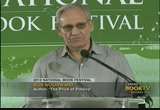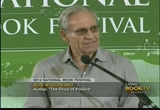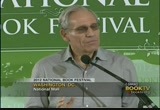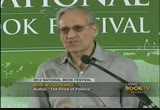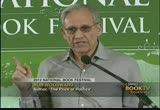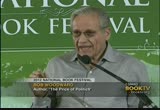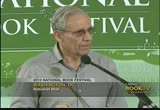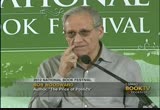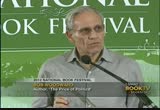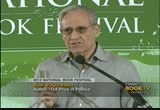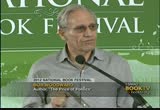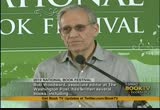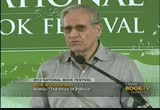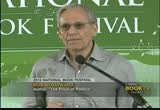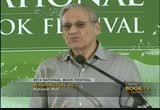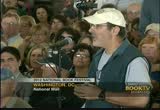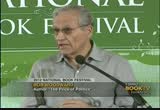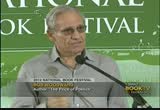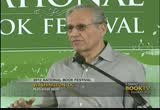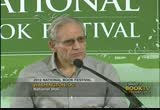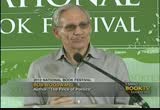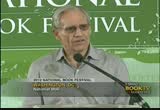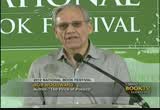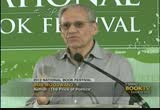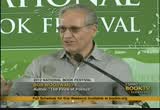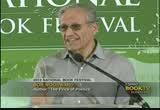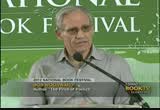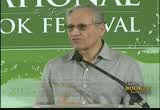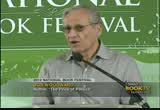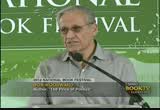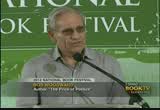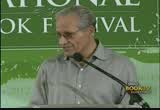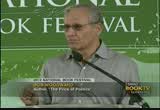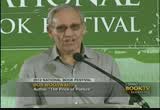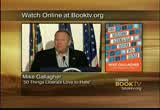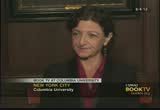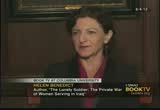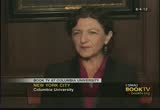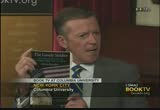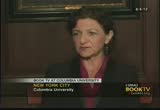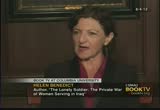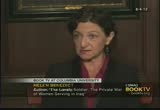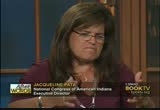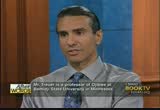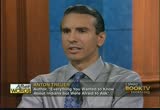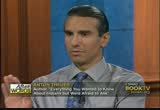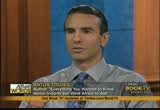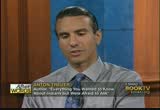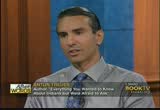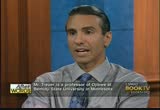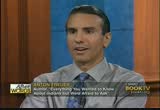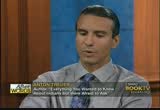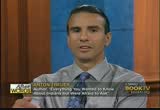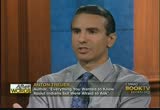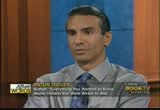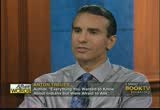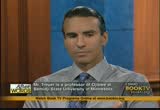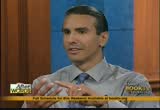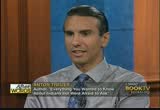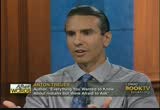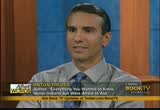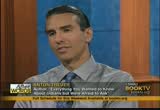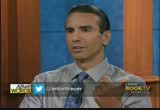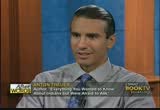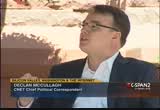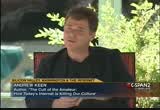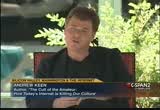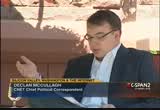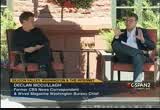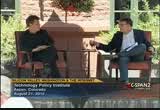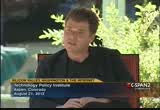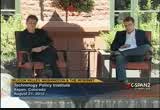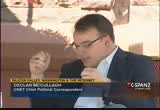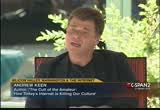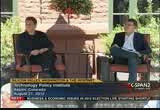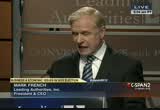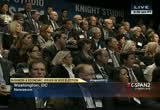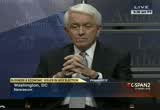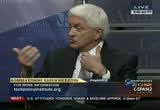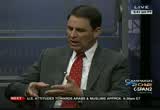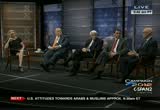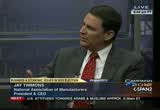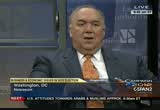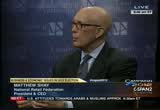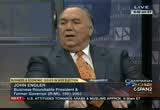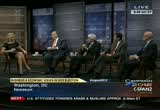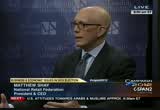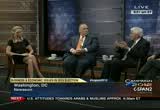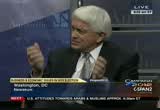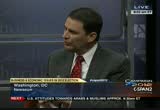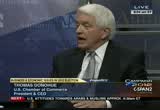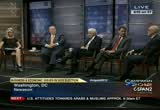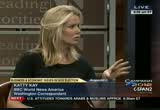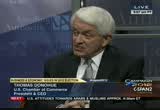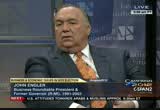tv Today in Washington CSPAN October 9, 2012 6:00am-9:00am EDT
6:00 am
festival on the national mall in washington, d.c., bob woodwardln presents his book price of politics. this is about 45 minutes.alk too ..ave lots of times the questions. and i want to begin by recounting something that occurred about five or six years ago my wife and i were at an aging conference and how to deal with aging. how many people are interested in the subject of aging? raise your hand. okay, you all are. i tell you.
6:01 am
at age 69, i am deeply interested in the subject of aging. and they have psychiatrists and physicians and so forth on this panel. james watson, who was the codiscoverer of dna, the nobel prize winner was also on the panel. we had the discussion and it went on for an hour, and watson said nothing. that is the end of zero comments. now, you know the power of silence was just overwhelming, and so finally, the moderator, charlie rose asked him, doctor watson, you have done so much work, how do you deal with aging. and so he leaned into the microphone and he said there is only one way to deal with aging. and that is to stay away from
6:02 am
old people. [laughter] he nailed it. my wife and i were sitting behind doctor henry kissinger, who was in the audience. they handed out his little sheets where you did self scoring. self scoring on your lifestyle. how often do you eat red meat, how many bowel movements you have a weak. [laughter] general health questions. then you have points or you lost points and you added it up, and it told you how many years you had to live. now, how many people here want to know how many years you have to live? the skeptical as him as that might rightly be about the scoring sheet, it's very interesting. kissinger was filling this out
6:03 am
with all the intensity hunched over and so elsa and i availed ourselves of the reporter's freedom of information act. [laughter] and we looked over his shoulder. we wanted to see how many years he had to live. he added it all up, and it turned out that he died four years ago. [laughter] not happy. i have seen kissinger really unhappy because of things we have written. but this was the depth of unhappiness. and so he looked around, and this was done in pencil. he erased all the answers. he rescored. the last time he ate red meat was in 1949. how often do you exercise a
6:04 am
week, seven, eight, nine, 10 times a week. and it turned out that he had eight years to live. what is the lesson here? kissinger is the master of this, read his books, he resource history like no one else. but it is the basic problem in journalism and trying to understand politics and what is going on in the world. i was telling this story the other night about al gore, having dinner with him, sitting next to him, not having dinner, sitting next to al gore is taxing. it is really unpleasant.
6:05 am
we asked him what was going on in the white house and he said 1%. i believe it is higher. but if we step back, we often don't know what is going on. that is the dilemma. i want to talk briefly and then answer questions about her new book that i have done, which is just out, called the price of politics. it is about 3.5 years of negotiations between the obama white house and the republicans in congress and the democrats. how they essentially tried to bring the federal government's financial house to some kind of order. the answer is they failed. we have a federal government whose financial house is in total disorder, total disarray. it is a historic problem.
6:06 am
to try to put it in english, we have a trillion dollars of iou outstanding in the world. the negotiations, they agreed to raise what they call the debt ceiling, so the government can borrow a couple more trillion dollars. we are going to run it run out of that borrowing authority january or february of next year. they're going to have to go back and authorized congress for more trillions of dollars of borrowing. the republicans and lots of people in congress don't want to authorize that. so there is going to be a bloody negotiation, unless they can work a deal. in a sense, this is a book about the past, but it's about the present. it is about where we are going and what the country's future
6:07 am
is. if you think about it i would argue that the inability of the government to fix this borrowing debt deficit issue in the book, vice president biden's chief of staff, talking about the economic crisis in 2011, that's exactly what is going on. there is so much evidence that it is the biggest future. we are on the path becoming europe and greece. you just can't keep borrowing money. there is a stunning and fiction in this country, and we need some sort of we need some
6:08 am
serious intervention. in the book, what i attempt to do is take people to the presidents and leaders and tell you exactly because of the luxury of time and my publisher, simon & schuster, i declined to get the meeting notes to get the exact detail to interview president obama and speaker boehner and the key players in this. i just want to take one quick snapshot from what happened that we didn't know about, which is critical. when the cops pull up less
6:09 am
when the president was upset, he called the congressional leaders on a saturday morning at 11:00 o'clock a.m. something in democratic andemoat republican leader were trying to work outth the own deal harry reid, the democratic leader, said to the president, mr. president, could you please leave the room? i have covered presidents for four years. i know of no other time where the president was asked the meeting in his own house that he had called. i asked the president about this. i said how did it feel to be voted off the island in your own house. because that is what happened. he said that he was not going to stand on protocol, that the problem needed to be solved. but in the next day, he called democratic leaders to the white
6:10 am
house from 6:00 o'clock on a sunday night. and harry reid is there, the house leader, the relations between and among the democrats are so not solved, that harry reid, is a chief of staff, makes a presentation on the deal if reid is trying to work out with the republicans. in the course of doing that, david corn says to the president of the united states, in the oval office is in his house, i am disappointed in this white house and you for not having a fallback plan. literally, again. somebody reading of the president in the oval office for not having a plan. after the meeting, harry reid said to his chief of staff, stood up to him, he needed to hear it. no one was telling him.
6:11 am
think about it for a moment. what is the second most powerful democrat in washington have to use his chief of staff as a lever to send a message to the president of the united states? i was talking to somebody from amazon.com the other day. as you may know, they take books and they divide them as red states and blue states. most of the books selling in red states, republican state, blue state, democratic states, and i have said, where does this football? where is it to and he said well, it's purple. because it has information about both sides in all of us. it shows that there is a war going on, not just in the democratic party, but the republican perhaps much more
6:12 am
intense. john boehner is trying to work a deal with the president to do tax reform and entitlement reform and his deputy, the majority leader, calls people like paul ryan, who is now running for vice president. .. >> if you keep doing this, you are going to risk your speakership. the president said when i talked
6:13 am
to him, interestingly enough, he said in fixing -- he realizes the magnitude of all of this, as does speaker boehner, key democrats, key republicans realize what it is. and the president literally said to me, i would willingly lose an election if i could solve these problems. it is that serious. tim geithner, the treasury secretary, in the book is quoted thousands of words telling the president, you have got to do something about this problem. we have to fix it. you literally, it's not that we're going to close down the government, we will close down the american economy and, in turn, the global economy. if they do not solve the issue of this runaway spending, get some way to stop borrowing in
6:14 am
excess, he tells the president of the united states if we default on this, on our obligations and our ious, we will trigger a depression worse than the 1930s. anybody here remember the 19 1930s depression? you probably don't. i don't. i was not born, but i've read about it. it was a calamity for the world. tim geithner said to the president what, if we default on this, if we do not solve this problem, we will have an economic catastrophe that will make the 2008 financial crisis a footnote in the history books. anyone remember the 2008 financial crisis? that's coming not from some columnist or journalist, that is
6:15 am
coming from well-informed secretary of the treasury. you think about this, there is a value in running scared. if you think about after 9/11, the terrorist attacks, one thing the country did collectively is they set up tsa, the screening at airports. there are all kinds of work, very significant work done to make sure terrorists did not get into this country. it's been successful to date. it is one of an amazing achievement. if you think about september 12, 2001, the day after 9/11, it was almost a certainty there were going to be terrorist attacks in this country. there are not been. hundreds of billions of dollars
6:16 am
have been thrown at it, all kinds of intelligence efforts, screening efforts, thinking efforts, some of them perhaps extreme, but it worked. this was a time when the government and it leaders in both parties ran scared. they are not running scared on this issue. and if you look at it, it is the thing we know about that is going to do us in. and we've got to fix it. and go for a moment to the presidential campaign going on before us. what are they talking about? not this. not the ting that's most evident -- not the thing that's most evident. why are they not talking about it? part of it i would say it's the responsibility of the people in my business, the media. the candidates are not being asked about it enough. it's also complicated. um, it's also something the candidates if you look at what
6:17 am
they have said on this issue, both obama and romney's plans are vague. if i were moderating the debate that is coming october 3rd, i would spend about half of it asking them what would you do specifically. give us the diagnosis of the plan -- [applause] and tell us what you're really going to do. and part of that question is there has to be a willingness to compromise, and there has to be an innate willingness to do things that are painful for your side. i'm going to stop there, and we'll do questions. one more story. remember years ago the head of simon & schuster after i had published one of my books took me to dinner in new york city at one of these restaurants where you would never want to go where you have to pay.
6:18 am
[laughter] and he said what's your next book going to be about in and i said, oh, well, i haven't decided. i'm going to do some thinking, some reading, some research. and he looked at me and said, what? i said, yeah, i want to do thinking, reading, reporting, weighing the alternatives, and he said why are you going to waste your time? [laughter] i said, well, that's what you try to do. and he said, no, no, no, you are one of our authors. i need to know right now, tonight, what your next book is going to be. i said this is, that's preposterous. he said, i need to know. now, he's one of these people who grinds on you, and you're at dipper alone no matter what would come up, he would bring the subject back to, oh, maybe you should do a book on that, what about this? he would just grind away. you may know people like this. [laughter] you may work for somebody like that. [laughter]
6:19 am
even better, you may be married to somebody like that. [laughter] who just grinds away. so he wouldn't let up. so finally at the end i said to him, i figured out what my next book is going to be. he said, oh, that's great. he said, what? i said, my next book will be an expose of the publishing business in new york city. [laughter] and instead of showing disappointment, he said that's a terrific idea. i have a great title for you. i said, i don't think there are any great titles left. he said, there's one. i said, what? he said, your book, an expose on the publishing business in new york city would be called "my last book." [laughter] and he meant it. [laughter] [applause] okay. questions. open microphone. go ahead, sir. >> yeah, hi, bob. i want to ask you something that's alluding to the
6:20 am
off-the-line comment you said on al gore. you know that you've been studying the white house 40 years, and you know people all have their own perspective, they all want to be saying things. and if you're the president, you have to listen to all these people. over your 40 years, how did the presidents react, and which ones really did a good job listening and making decisions? >> yeah, that's a great question. i mean, in journalism the great art, and it's hard, is to really listen. and the key to getting people to talk is to take them as serious a. [applause] atake themselves. -- seriously as they take themselves. that's one comment feature. president, most people in government, they take themselves seriously. you find increasingly with all the presidents i've tried to understand that the more time they get in office, the more they like to talk and the less they like to listen. and that's a problem.
6:21 am
and i was reading the george cannon biography, one of the great books. he's the diplomat who really established the containment policy. and at one point cannon writes in his diary when they've made him ambassador to yugoslavia, he says there is a treacherous curtain of deference that falls on you as the boss. happens to everyone. but it happens ten times to presidents, that treacherous curtain of deference. and everyone is, oh, mr. president, mr. president. and what a president, like any leader needs, is somebody who will tell him the truth. >> this upcoming election and before the inauguration has been described as a period of time
6:22 am
that's going to be the lame duck session of all lame ducks. and i wanted to ask you the same question that you would ask the candidates which would be something like we're about, we're approaching a fiscal cliff, and this is all going to the happen shortly after or just prior to the inauguration or some time in january. what, what is the, what do you see or what do you predict or what needs to be done to avoid this fiscal cliff? >> okay. happily, i don't have to decide. [laughter] and i don't know. but, i mean, the fiscal cliff is a euphemism. i mean, it's financial. it's the basic financial soundness of the government which connects, believe me, to the value of everything you have, a house, a bank account, an investment and so forth. and it is all in jeopardy. it should be called the financial time bomb. and it's tax increases, it's
6:23 am
spending cuts, but it's also what i spent a lot of time in the price of politics writing about where you have to extend the debt ceiling. they, the white house, whoever is there, is going to have to go to the congress and say, gee, you know what? we're borrowing a trillion dollars. i mean, think about, i was trying to figure somebody was asking, well, how much is a trillion dollars? that's about $3,000 for everyone in the united states. that's a lot of money. they have to borrow that next year just to pay for what's going on. and how they're going to do that, how they arrange it, i don't know. it's going to be, you know, i may have my second book. go ahead. >> hi. in your interviews and in your research, i was wondering how much you came across discussions among the leadership about dealing with the serious problem of jobs in this country.
6:24 am
because we're in a second major depression many say since the great -- and it's sort of contrary or contradictory to be concerned about the budget deficit where you'd be taking steps that have a negative effect on the economy, so how much did that take effect -- >> excellent question. and, of course, you create jobs by growing the economy, and you have to not only grow the economy, you need to stable i'd it -- stabilize it. you can't have the situation we're in where the interest rates are right in the basement. and as someone says, you can't jump out of the basement. that's as low as it is. and if people stop trusting u.s. treasuries, the $16 trillion of debt we have out there, interest rates are going to skyrocket, interest payments will go up annually potentially by hundreds of billions of dollars, then we would have more deficit, there
6:25 am
would be less trust. and so you haven't -- you've wrecked the government's role in the economy. those are my secret notes, i'm going to ping -- pick them up. [laughter] so you have to stabilize that. and you have to figure out a way to get the economy to grow. and that's a long-term proposition which will lead to more jobs. but you're right, there's some contradictions in all of this. but in trying to create more jobs, you can't mess up with the overall problem of the trustworthiness and creditworthiness. you're shaking your head. we'll talk afterwards. next. >> hi. over the course of your career, you've had the most incredible access to all these, um, great politicians in history and even today, and i was just wondering out of everyone you've met, who surprised you the most?
6:26 am
who is like the least like how they are perceived in history and in the current media? >> oh, wow. that's like asking the question about the creation of the universe. [laughter] they're all interesting, they all have their -- i mean, i just get fascinated with the story of government and what really works and, quite frankly, what we don't know. what is hidden. i remember for a book i did called "the agenda" on bill clinton, and it was about his economic plan. i interviewed him once, and it was on background. but he's talked about it, so i have talked about it. and you go into to the oval office. this was early 1994, and clinton drills you with this eye contact that is absolutely a
6:27 am
gravitational force. i've never seen anyone maintain eye contact like bill clinton. and to a -- and it's unblinking. and he just stares and, of course, it creates a sense of intimacy, it slows time down, and i remember thinking this eye contact is amazing, and somebody later suggested to me, said, well, he wanted to be president ever since he was 5. [laughter] and he decided to contribute all organs in the body to the task. [laughter] including the eyes. [laughter] and it's, you can drain yourself. you just don't -- you can train yourself, you just don't blink. so we're going through there, and i thought, oh, this is a great interview. and he's so focused. i each started thinking, oh -- i each started thinking, oh, he
6:28 am
realizes how brilliant my questions are. [laughter] which they weren't. and i thought, left this if and thought, oh, there's this amazing interview. of and i went back and had somebody transcribe it, and i read the transcript without the eye contact, and it was mush. [laughter] he didn't say anything new, didn't say anything that was particularly useful. i think i used one sentence in the whole book from the interview. but, and here's the essence of the clinton communication style, it felt good. [laughter] it felt wonderful. [laughter] and if you look at the reagan tapes, when he was president, everyone called him the great communicator. he's a nothing compared to clinton. clinton, i remember interviewing -- there were, there was one meeting where about six or seven people were
6:29 am
in the meeting with clinton, and i asked them each what happened, and there was this one woman who didn't say anything. and i said what'd you think of the meeting? and she said i know he agrees with me. [laughter] wow. i mean, that -- i mean, if you can go -- anyway. end of point. >> my question is a little bit simple. it seems to me that where we're at right now is almost at the end of the current monetary system. so my question is, how much talk has there been in your circles about ending the current monetary system, stopping the issuing of money at debt and perhaps going to a united states note instead of federal reserves note? >> well, that's a neck call economic issue. -- technical economic issue. you can't bail out on the $16 trillion in ious we have. you just can't. it would be the disaster and the calamity. i don't think, i don't think you
6:30 am
can do this with a magic wand. i don't think -- i think the, if you go back to the 1980s, what reagan and tip o'neill did to save social security, they worked a deal where payroll tax went up, the most regressive tax in the history of this country, and they agreed to cut back on some benefits. and part of the deal was -- what's that noise? is gordon liddy out there somewhere? [laughter] you're too young to remember gordon liddy. [laughter] you -- o'neill and reagan. part of the deal was we're raising the tax, we're cutting some benefits, and so o'neill says to reagan, look, you go out and say whatever you want about what this deal is. and i won't contradict you.
6:31 am
and i'm going to go out, and i'm going to say, describe the deal i want it described, and don't you contradict me. deal made, it's gone. no one, no one objected. it was voted through the congress. people who ran, i know a couple of senators who ran i think first in 1983 like john kerry. he said in his campaign the issue never came up because there was no clash. there was no conflict. part of the deal was, i mean, look, obama and speaker boehner would have a much harder time making a deal because they had problems in both of their parties as they say, but in talking about this with them if they'd had -- what's the word? -- courage to say let's make a deal and go out, get before the microphones and the cameras and
6:32 am
say this is what it's going to be, and this is going to be painful, and we're going to ask all democrats and republicans to vote for it because we have to protect our financial future, because that's what it's about at the end. they essentially told me they thought it would work, that they could have done it. and, of course, they did not. yes. >> are bob, that's a good lead-in to my question. the grand bargain that came to the floor towards the end, the president put entitlements on the table. i don't recall the world unraveling from that notion. how real do you suppose that proposal was, and are we likely to revisit that in the spring? >> well, it gets into detail, and i have a whole chapter on this, and it has to do with six senators saying, gee, we can ask for more revenue, it included three more republicans. david plouffe, who's the president's political adviser, campaign manager in 2008, has
6:33 am
tremendous influence in the obama white house. am i pointing the right direction? is the white house that way? is yes, okay. and he said, we've got to do something, we have to ask for more revenue. and one of clinton's -- one of obama's other advisers came this and said -- came in and said if you don't ask for more revenue, you will be part of the presidency, the weakest presidency in the history of mankind. i mean, imagine being in that situation, getting that advice from one of your aides. so the president picked up the phone and said we need more revenue. he insists it was an offer speaker boehner is equally insistent that it was a demand. i talked to him, talked to all the people. now, no one else was in the room, there's no secret tape recording of that phone conversation i know about. if anyone does, please, give me
6:34 am
a call. [laughter] but why do that on the phone? you shouldn't do that on the phone. you should other people there so it's carefully, you know, i mean, it was changing or making a proposal at the end that set this off on a track. it is a very dramatic story, and it brings to the fore the issues that we're going to be dealing with in three or four months. yes. >> you may have already allude today this somewhat in answering a previous question, but, you know, congressional approval is at record lows, and people left, right, center, everywhere talk about how broken government is. and what are those things there your perspective that have broken it, and what are those things that if they were removed either individual or structural, um, that would help fix it? what's the path forward? >> you know, that's above my pay grade. [laughter] it's, it's enough of a task to
6:35 am
try to find out what happened and so forth and to -- you do play in your own mind what should have happened, what could have happened. i mean, it's a pattern. it's gone on a long time. a lot of people, and there are books on this, there's analysis saying it's all the republicans' fault. there are books and analysis that it's all the the democrats' fault, it's all obama's fault. i'm purple on that question and in the book conclude that they both have responsibility for this. [applause] and it's a shame it's not part of the dialogue going on in the election. we're going to pay a price for this, and just, you know, the note on your blackberry that we talked about this september 23rd, and when the bridges start burning in or -- in four or five
6:36 am
months, i was saying this to somebody. if you remember 9/11, in august of 2001, six weeks before 9/11, there was a top secret intelligence briefing given to president george w. bush. and the headline of that top secret briefing was, and we ran it in "the washington post" after it became a big issue, was bin laden determined to strike in u.s. now, think about that. you're the president of the united states, you get a top secret report saying bin laden determined to strike in the u.s. you should do something. well, we know not enough was done can. we know that the government across the board failed to do what was necessary on potential terrorism, and we had 9/11.
6:37 am
i tell you the theme song, the big music in this book i've written that i've tried to present is u.s. economy about to falter. and it's a warning. and it's disappointing, to be honest with you, it's agonizing that it can't get into the dialogue because we have a presidential election six weeks ago -- six weeks from now in which whoever, whether's obama, romney, they're going to have to sit there, and this is what they're going to be spending your time on. yes, young man. >> hi. um, i just -- oh, 13. >> thank you. >> i just wanted to say, first of all, that i am right in the middle of the price of politics,
6:38 am
i'm in the middle of chapter 20, so it's an incredible book, so thank you very much for writing it. >> i know lots of adults who can't read it. [laughter] >> thank you. so, um, my question is, um, i'm at the end of middle school, and i want to become a journalist when i grow up, so -- [applause] okay. so you have had an incredible career, and you're one of my idols, so i just wanted to ask you, um, any tips for young people like me who want to become a journalist and want to see the world? [applause] >> you've chosen, perhaps prematurely -- [laughter] a great career. i've often said if somebody came from another planet to the united states to spend a year and they went back to, say, mars and they said who are the people that have the best jobs in america, the interplanetary
6:39 am
visitor would say, oh, the journalists. why? because as a journalist you get to make momentary entries into people's lives when they're interesting, and when they're boring, get out. [laughter] there's no other profession where -- if you're a lawyer, you're stuck with clients that may be boring. if you're a doctor, you're stuck with patients, it may be routine. in journalism the question every morning when you go to work or whenever it is, what's going on, what's going on that has meaning, and what don't we know about it? and so if you think about it, um, good luck. let me know when you're looking for a job. [laughter] [applause] what's interesting, he's telling -- the book is 40 chapters long, and he says he's halfway through on chapter 20.
6:40 am
>> i'll challenge you. as a nurse practitioner, you get to be involved with people at the most important times of their life. [laughter] i love that job too. [applause] >> well said, well said. >> but my question is about the freedom of information act. and small-time people like me can't get the same information you can. so, for example, i represent my little citizen association, and i asked lincoln county for some information on where they're spending money in a certain area, and you they would chargee $850 to get that. and another time i asked they said, well, it would be about three or four thousand pages -- boxes, not pages of stuff, boxes of things. how as a small-time person who already has a full-time job, how do we work with the freedom of information act to get the information we want? >> okay. somebody from the library of congress, dr. billington, was asking me in the movie version
6:41 am
of "all the president's men," the reporters go to the library of congress to look at what the white book, the white house has been checking out, and somebody said, gee, can you go to the library of congress and find out what other people have been checking out? and, of course, no. but how did we get somebody? we went to somebody, and it's in the movie, and we said, sorry, dr. billington, how about breaking the rules? how about helping us? we're not going to misuse this information. go to the people who have those documents and say, look, um, why don't you help me, give them to me. you've got them here, i'll get 'em xeroxed or something like that. and an appeal -- it's amazing. i, in fact, think that everyone in the united states is a secret
6:42 am
sharer, believer in the first amendment. and appeal to conscience. if you can't get them to help you, call me, and i'll call them on your behalf, okay? [laughter] [applause] >> i'm sorry that we don't have time. >> yes. mail is woodwardb woodwardb@washpost.com. if anybody else has good information. last question, right? oh, i'm sorry. i'm over time. my god. yes, quick. >> one last question. >> hi, mr. woodward. big fan of your work. unlike the young man who just came before me, i still haven't had a chance to read your book, but i look forward to. it seems like a theme throughout this book is the sort of both sides do it, color purple, bipartisan thing. now, of course, politics is very much about having two different sides with admittedly, you know, different views of america and different policy solutions, going out into the public,
6:43 am
presenting their views and then having the public decide through elections or through civil discourse what policy direction they want to take. so i'm interested in terms of the sort of access you've gotten to the democratic and republican leadership in your view of the debt ceiling debacle whether you found that one side or another side was more intransigent or much more stubborn to negotiation or concession than the other side. >> that's a great question, and i do put responsibilities on both sides, but i do say at the end that if you look at presidents reagan, presidents clinton, criticize them as you might in lots of areas, by and large on important national business they've worked their will. they found a way. and in this case obama did not find a way. the leader of this country is the president. and if things go well or not well, it's going to be that these things happened in the obama era, not the john boehner
6:44 am
era. and presidents have to lead, and presidents have to learn how. and in this case we got up to the goal line. he didn't take it over the end, the finish line here. and so we live in a country -- [applause] with those, where the maximum burden is on the president. but if you, when you, if you look at the book, you will see that dealing with the republicans is not really an easy thing. and as -- [applause] i left to value office, president obama said, you know, if bob dole or newt gingrich had been here,
6:45 am
>> he self-identifies as a liberal, lives life as a liberal and wishes we were liberal. think michael moore, nancy pelosi. think your local college professor. you know, think the driver of the crazy car with all of the bush is hitler bumper stickers on the back of the car. think the gender studies wearing the head band at your local whole foods store. you get the picture; right? they no , nominate professions leaving a cultural imprint, cultures like journal ism, arts, academia, and america's fastest
6:46 am
band of intertapers, circumstance day sew lay success bats. who are these people who call themselves liberals? how does such a small group impact our lives? what motivates them? i'm in an excellent position to answer the deep questions because i've been watching liberals closely for over 30 years, studied liberals like jane goodall studies her chimps. [laughter] in their natural habitats and without judgment, in silence mostly because we barely speak the same language. i've been tireless in research. i lived with liberals, broke bread with them, humored them, teased them, prodded them, and, yes, even loved some of them, some my friends, and some members of my own family. my commitment to understanding liberals worried my dear conservative friends and questioned my health. i read the new yorker magazine.
6:47 am
i went to see the vagina monologues, listened to npr when i got the chance. i learned everything about the fly one could tuning into "all things considered," and i watched my carbon footprint as a guy who owns a well cooled home in dallas can watch my footprint. what did i learn from three decades of research? i learned liberals don't love many things about this world. they are trying to correct, fix, mend, and adjust every aspect of other people's daily lives. they spend a lot of time thinking about america's faults, how to direct them, liberals love to hate things that most americans love. they spend the rest of their lives endlessly trying to take things away from us and convinced they do it all because they love us, thus, was born this book "50 things liberals love to hate."
6:48 am
i hope you'll end joy it. >> watch this and other programs on line at booktv.org. >> and our conversations with professors here at columbia university continue on booktv on c-span2, and now we're joined by hellen benedict, author of "the lonely soldier". war happens to people one by one. what's that mean? >> guest: i was struck by that quote because i was following the war home to the heart of every individual fighter, a phrase i quote from dh lawrence, and war affects every single individual involved in it whether they be soldiers or civilians. it has -- it's a monster that reaches deep inside every single person, and it turns every life upsidedown, and i thought it a
6:49 am
very apt quote. >> host: how many women served in the iraq war? >> over 200,000 served in iraq and afghanistan together. >> host: americans? >> guest: yeah, americans. >> host: is that unusual? >> guest: yes, the iraq war set a precedent, historically. more women received, have been wounded and killed in the iraq war by around 2005 two years into the war, already, and now all the american wars put together since world war ii including afghanistan. it was a huge, huge difference. one in every ten troops in iraq was a womb. >> host: did they serve in different capacities than in the past? >> guest: yes. because of the nature of the war, which is basically a guerrilla war, the nature of all wars these days, there's no front line in the old-fashioned sense. drawing a line in the sand or app area where the soldiers from
6:50 am
the enemy sides meet up and fight. that doesn't happen anymore. battles take place in hospitals, even if you drive a truck full of toilet paper, you can be attacked. because there's no front line, even if your combat support or engineer or a cook, you can get drawn into battle, and many, 34 women also were used as gunners and working alongside with the infantry doing exactly the same job as the infantry because of the shortage of troops. >> host: but women are not supposed to receiver in combat; right? >> guest: not air combat, but ground combat. on the ground in reality, women have been fighting in combat in iraq and afghanistan for ten years. >> host: was there a typical experience for women in iraq and afghanistan for american soldiers? >> guest: it's hard to say
6:51 am
typical because it really did vary depending on the year they were serving, where they were serving, and who they were serving with. the stories i did share were the most common of story i heard were ones of isolation because, as i said, one in ten troops of women that they don't necessarily get deployed together so many women serve with very small number of other women, vastly outnumbered by men, sometimes even alone i talked to women who were the only ones serving with 60 men. the ietionlation of receiverring -- isolation of serving like that can lead to a lot of problems from constant harassment, loneliness, sexual assault, and rain. i heard a great deal more of those stories than expected when i started research. >> host: that is a common theme -- harassment and sexual assault. >> guest: it is. >> host: who is eli crowe on
6:52 am
the cover? >> guest: a career sergeant, in the military 22 years by the time she was deployed to iraq, and she was a car gent first class and had been a drill sergeant as well. she had also serve in honduras and at home and really had a long career behind her and was very enthusiastic about the army, until she got sent to iraq. iraq was a different experience for her. partly because of the racism she experienced and partly because of the -- the, i would say discrimination both rationally and sexually that she experienced, but also because of the nature of the war itself which she ended upturning against. now, i'm not saying this is typical of every soldier, by that's another thing i heard from more soldiers than i expected was a great deal of criticism about the war based on what they saw on the ground and
6:53 am
by what we hear about in our armchairs at home. >> host: professor, how did you find the five women that you focus on in the book? >> guest: i interviewed 40 women who served in iraq over three years. i found through veteran groups mainly, one led to another whom she received with who led me to others, and partly it was a networking process, partly it was people hearing that there were somebody out this writing about women in the military, and they wanted to be included. a lot of the women came to me. they were felt inviz l, risking life and limb like men, but they were not recognized the soldiers and taken seriously. they felt they were missing that. they wanted their service recognized, and others wanted to bhis l blow about the -- whistle blow about the degradation they experienced. some came to me, some i found, and in the 40, i picked five in
6:54 am
hopes of finding a representation of, you know, of economical range and also socioeconomical rage, gee geographical range, age, experience, attitudes, tried to get a range so it was a fair book. >> host: so the outliers in your research here would be those who continue to support the war and were not harassed? >> guest: well, the -- >> host: [inaudible] >> guest: some srb surveys show some 99% of women are harassed while receiverring. the out-- serving. when it comes to sexual assault and rape, it's between one and five and one and three. horrendous figures. figures from surveys conducted by the va, veteran's department of affairs, and the military, itself, by the way, but there are fewer than ones who are not
6:55 am
raped, and i give statistics in the book, but the numbers are so horrific of epidemic proportions, i felt it was important to focus on this because other books with respect and hadn't. people were not aware of the degree to which we are persecuting our own soldiers. >> host: you're a professor of journalism, is this a typical book to write? >> guest: well, in our journalism school, we are working journalists, and we do in-depth reporting. we have the academics among us, but we are working journalists who teach. that's always been the profile of the school ever since joseph pulitzer founded it. >> host: have policies changed because of the experience of women in iraq and afghanistan? >> guest: yes, they have. there have been many congressional hearings about the issues of harassment, and i testified twice to congress myself.
6:56 am
they have changed some rules, policies, and approaches. they've introduced more prevention training, sexually assault counselors made available for women and men because sexual assault is a huge problem for men as well in the military, and there have been reforms, but we have a long way to go. the rates of sexual assault do not seem to be dropping. the prosecution rates within the military justice system are scandalously low, and there's a long way to go. congress' been pressing the military to do something about this for many years now, and the military has been extremely slow to respond in a really productive way. there's a lot of denial been going on. >> host: should women be allowed to serve in combat? >> guest: yes. we are human beings. we have a right to have whatever jobs we want, not all of us with choose that job or want to be in combat, but not all men want to
6:57 am
be in combat either. it's very paternalistic to deny women a chance at a job just because of their gender, and, indeed, there's a suit going on right now that the "new york times" wrote about this very morning in its editorial which on behalf of two women officers who are suing claiming that it's unconstitutional to be -- to bar women from combat because it denies them equal protection under the law. >> host: now, you also wrote a novel -- >> guest: i did. >> host: called "sand queen," what is this? >> guest: i'm writing a cycle on the iraq war, fiction and non-fiction combined. it's a woman in iraq at the very beginning of the war, guarding the first and biggest prisoner of war camp we set up over there, and it goes back and forth between her story, her experience as a woman soldier,
6:58 am
and the story of an iraqi civilian woman. they meet at a check point, and they begin to interact. in is based on things that my soldiers had experienced, and that you get to see the war from both the iraqi and american point of view, but told through the eyes of women which is a rare way to tell stories of war. >> host: when you look back at the media coverage of the iraq war and currently the afghanistan war, do you feel it's been fair? do you think it's been comprehensive? >> guest: it depends which nation's media you're asking about. >> host: u.s.. >> guest: i think we did a very bad job at the beginning of the war as has been universe universally acknowledgedded. we were too blinded by reactions to 9/11, and we did not face -- we did not question the reasons for going into iraq enough. we accepted it face value the things we were told.
6:59 am
we did not dig deep enough, and we have persisted in ignoring the iraqi side to a quite shocking degree. in fact, to find out what was really going on in iraq during the war, i had to turn to british and french journalists, people covering iraq since the 1970s, spoke arabic, knew the area, we have a lot of people like that. not enough. we had censorship, not allowed to show coffins coming home, not getting true numbers of the dead on either side, not getting a good enough idea of the chaos that was what all war really is. i would have to be quit critical exhale about it. i am generalizing, and there have been individual reports who did an incredible job of covering that war and other
7:00 am
problems in the middle east, and i would like to pay tribute to those who rest in piece, example of a splendid reporter in the region. >> host: have you written about war previously or was it just this war that grabbed you. >> guest: a little bit of world war ii, but i've never written about combat and actual war on the ground the way i have here. .. >> deny than help a whole lot more. >> helen benedict is the author of this book, the lonely
7:01 am
soldier. she is also the author of this novel based on the same research, a novel., a helen benedict has joined us h here at columbia university. >> up next on booktv, "after words" with guest host, di executive director of thecongres national congress of american om indians, jacqueline pata. this week anton treuer and his latest book "everything youk ev wanted to know about indians but were afraid to ask." the professor of ojibwe history answers more than wanted questions about native american culture and he'sre been asked pl during public lectures. thestion questionss range from thoughtfl and humorous to what some would considernd offensive.of >> host: first of all i wantt: o to tell you that i loved thek. book. iughl thoroughly enjoyed readins and i was so glad to see the questions that you answered.ere because in the beginning of my privilege started doing more thg
7:02 am
things and outside of just indian country i always tried to create a space people could be able to ask any question they wanted to ask and make them feel comfortable and you get all sorts of questions. you know they've been dying to ask those questions. in your dhaka you covered a lot of those questions and i was glad to see that. in the beginning in the introduction you actually call it yourself and ambassador. maybe you could share with us why a.m. ambassador coming and what do you see in that role what prompted you to want to write this book? >> guest: great question. first it is horribly unfair that anyone should ever be an ambassador for their people and one of the issues that comes up with native american history and culture and that is no such thing as the native view so it's
7:03 am
a loaded question to say what do they think about mascots per capita payments of course it is not that simple. the emotionally charged opinion on any issue that you could imagine on the one hand no one represents the entire native view and that is one of the most important disclaimers i put in there as well but at the same time i guess growing up in northern minnesota on the reservation and nearby where maybe 30% of the population of native and half of the population is needed -- >> there were so many mean-spirited comments and misunderstandings from the years and it seeme like the two worlds, the natives and the non-native world so rarely interact and they would send kids to the school on field
7:04 am
trips to hundred miles away to minneapolis driving around the reservation to get there. it's like many kids will go someplace with a zip code density bigger than the one i came from and i will escape this borderland command of course when i went to college the first question i went to princeton university i hope these guys are good to be well-educated and know something and the first question is where is your tomahawk? the borderland follows me everywhere. there was no way to escape it. the only way through it and so i realized there are not that -- i wouldn't be the barometer by which a lot of people what, you know, understand or judge native people so i realize the importance of my work and that her presentation. >> one of the things i like about your book is balance and
7:05 am
that's important that type of community based upon balance but in the book we had a lot of balance, we balance the topics dealing with sensitive issues that might be sensitive to a non-native person like mike cherokee grandmother was a cherokee princess for the tribal community for enrollment and then you dealt with tough issues like the history of christopher columbus so there's a history lesson and then the ler enjoyment of reading the book. how did you decide what to include and what not to include in this book? >> guest: writing the book happened faster than my research projects and building up all of the questions of stuff has happened throughout my career has so many questions and i've
7:06 am
just been keeping them in a shoebox and sorted them out into categories and tried to figure out what would be the most important. what is one of the fun things about this book is you can edit next to the toilet and have a couple moving experiences and leave much enlightened, so it's easy, acceptable and approachable kind of reading but real answers, too. doing some bridge building is really critical work and a lot of the non-native people got to their sugar coated version of christopher columbus on the first thanksgiving and very little else to even feel like they have enough to ask the question. there's lots of guilt of when the issues are raised that inhibits a deeper conversation. so a lot of native people, you know, a serious look at the history leaves a lot of people really understandably angry. so a guilty person and angry person to have a meaningful conversation is hard and it's
7:07 am
critical work. going to school and not getting answers and christopher columbus and the first thanksgiving too to address the subject that it's safer not to teach because if you open your mouth you are going to offend somebody and all you need is one angry native parent breathing fire at you or your administrator and people retrieved. people never get a chance to learn about themselves and they're setting and it's very rare even in the tribal schools which answer to the curriculum standards and models that are not that different from everyone else. even the schools have to do this, so to create meaningful opportunities for the native people and the non-native
7:08 am
people, critical stuff and there is a lot at stake not just so people can understand indian, but really for the stability and longevity of our form of government and these are troubling times. you can look across the world. 77 kids killed in norway who are all children of political party that favored immigration. france, another long established democracy that is now been out long the wearing of the traditional muslim attire and the streets are here in the united states where in arizona not only lost passage of the racial profiling is but they say we are going to dismantle at the mix studies across the board in the state of arizona. and of all of the horrible this services it's not just the hispanic studies program which was successfully dismantled, but it's also for everybody. imagine the children in arizona
7:09 am
now being prepared for some fantasyland. that would never existence of the world where the children would actually live and operate. and succumbing to me, you know the sustainability of democracy in a political forum in the history of the world depends not upon our ability to assimilate all of our citizens, but our ability to support and enable things like cultural and linguistic diversity. >> you said this would be like in the bathroom book. i realized this is a book you can take up. many times this grab a section, read it, put it down. you didn't have to read it all the way through. that is one of the duties of the book, too. one of the topics that you address is something that is the number one question i get from those people who are politically sensitive and racially sensitive. a lot of them are doing the
7:10 am
right thing but they just don't know how to collis american indians and alaskan natives. so you know, what the right term native american, first american, indigenous people, how did you answer that? >> i guess this is one of the subjects and this comes up with a lot of things in the book where there might be a diversity of opinion even in the indian country. you will find some people who will say columbus had it wrong i am not an indian. don't call me that. and so, you know if it's important to be aware that there is that diversity of opinion out there for myself. it's far more important that we don't make everyone walks around on eggshells because having an angry disposition over something as simple as labels is a killer to the deeper understanding and it makes people shut down, not want to ask questions, not
7:11 am
understand and they retreat from the subject matter and we need people to embrace deeper understandings and feel that it's safe and okay to do that. so i kind of lay out the prevailing terminology and just about all of them have a level of issue or problem or christopher columbus thinking he was in china, japan, india and that made its transfer into european languages and stock. on the one hand i guess we can fault columbus. he didn't show up and say there are humans here. it had to be someone disempowered so that whole colonial mentality was problematic. but other terms can also be ambiguous and confusing whether its native if you say a native from annapolis does that mean a
7:12 am
native american from there are just somebody that's lived there for their entire life. so they think the indigenous people to most parts of the world, and so there are some ambiguities, but there is an effort to find respectful ways to talk about things. in canada they changed the terminology from reserves to first nations there's an effort to find emphasis on the nationhood of the tribal governments rather than thinking of them just as the cultural enclaves so there's an effort in that and certainly the tribal terms of reference you can always call people but the sentiment sounds gibber two use it for all of the native nations, so in the long run you
7:13 am
have to find overarching terms as well and i use them interchangeably aware of their shortcomings, but i think the emphasis should be on having respect in an open mind what did the conversation going. >> i agree about the respect principle. >> we have conducted many poles on the attitude and knowledge of the american public and what they think about the american indian people and about our tribal governments. it's interesting that most of the american public knowledge around the indian country kind of ended with our public education experience so they know about christopher columbus and pocahontas and thanksgiving but they don't really know what's happening in the tribes today, and the more contemporary information. let's deal with the issues around christopher columbus.
7:14 am
every columbus day i get a call from a number of media people who say what are you doing today, what do you think about columbus day and the fact of the matter is most people in indian country don't see him as a hero. do you want to share with us a little about that? >> there is so much to talk about on every one of the questions, but i think it is critical to look at this history and i have been astounded that for a piece of history that so much about columbus kept numerous journals, wrote lots of letters,took trips to the americas, and then starting in the second trip there were lots of officials tribes and army officials and all kinds of people doing lots of writing, missionaries. we know what happened. what astounds me is not just what happens, but 500 years after we are still not really talking about what happened. the story is still so often
7:15 am
sugar coated, and i think for example we know that there was a policy of genocide on columbus's second voyage, spanish government instituted a tribute to all the native people on that island of espagnole or what is now haiti and though dominican republic had to bring a certain amount of gold and to bring ten times as much with the spanish and to recognize as much of the gold they had seen kaine in trade from mainland mexico, and that gold was in espagnole was way under the ground and not readily accessible. so, you couldn't meet the gold dust tribute. for 30,000 people had their hands chopped off within 50 years 2 million inhabitants of espagnole had been killed or died. so if it was the beginning of a genocidal policy. we know this. but for some reason we are still
7:16 am
teaching 1492 christopher columbus sailed the ocean blue discovered a new world. how can you discover a place densely inhabited by other human beings and open the door to this new world set an example for us all and even though george bush the elder statement on the 500th anniversary of columbus' used exactly those words monumental seats, perseverance, established the jubilee commission this great navigator and leader and her native people even ones who don't know the entire history of columbus the just know there's something wrong in that perspective this is part of human nature no human being wants to be judged by their darkest days. no nation wants to be judged by their darkest day but when the nations have a dark days we have to acknowledge that to be the truth and reconciliation starts with truth.
7:17 am
germany had to do a lot of work around the nazi holocaust. formal apologies, reparations and it helps mitigated the chances of something like that happening again. here in the u.s. we have yet to get to -- we are seeing the first emerging effort that some kind of an apology, but we have yet to get to widespread formal policies, reparations mandated instructions. there's it's and pieces. i know wisconsin requires k-12 educators to take a class on native history. minnesota is trying to leave something into the curriculum. the beginning thinks that it's not nearly enough and as a result the misunderstanding. some people think they are all from casinos. some people think they are all living on where reservations and it's impossible for both things to be the whole story.
7:18 am
with the columbus narrative, too, that is exactly the case that there is so much to that story and there is so much to how we teach about it and if any of the subjects -- i remember one time asking the teacher would about the indians? and the teacher said that is who was here before and just kept teaching and i remember thinking but i am here now. in spite of it all a lot of people have that against native people over the past 500 years. the last of the fill in the blank with whatever you want to talk about in spite of it all we are still here and we still have sovereign governments and living languages. those are especially important things, so looking at the history of the misunderstandings columbus is just one of the first entry points and there are some really great material out there. i think this contributes a lot
7:19 am
to help setting the record straight. there's material into rethinking cullom this book published by rethinking schools which is in the packet so you don't have to take the kindergartners from the stuff with the hand chopping and covered in the blood or something you can start by talking about the colombian exchange and how the native ideas and tools are bound agriculture and medicine and give the knowledge of surgery introduced by native people to the rest of the world tools and ideas still used today. those are good entry points for helm native people have shaped the world, and then that is a good way to start and then when you get to the high schoolers you can lay it all out there and let them form their own opinions with lots and lots to discuss. >> host: thanks. you know another topic you dealt with in the book on the historical significance particularly for us as an indian country is that about what sets
7:20 am
the foundation for the tribal government today. to discuss the sovereignty and talk about the reservations and there is a really important message for us today as they were then. can you tell us why that was important and what were the lessons he wanted to teach the american public? >> guest: misunderstanding of so much. most americans are aware that the world is a diverse place. but, we tend to look at the indian country as, you know, a cultural enclave or sometimes, you know, but more sophisticated understanding might be that there are a few different cultural enclaves. without understanding, you know, the whole political dimension to what it means to be a troubled nation, and there are a lot of things politically and legally and culturally that make being a native very different from being on the shore something like that
7:21 am
where you do have the cultural enclaves even distinct languages from immigrant groups that have been maintained over time and the importance of maintaining that tribal sovereignty is something that should be important to everyone. of course it's important to native people it's an important attribute of identity and the most reliable source of understanding help for native people. incredibly when we had a 15% sustained unemployment rae at 15% in the united states they called it the great depression. we got social security, we got tennessee valley authority, civilian conservation court, medicare, medicaid, a huge massive public intervention that is still here today. well, you know, we backed before the casino the unemployment rate in the indian country was an
7:22 am
average of 50 percent, and after the casino rising tides didn't lift all they dropped to around 20% on average, so there was an impact. but for native people that great depression started in the 1800's and it has never ended and we are still waiting for our intervention. and the only organization trying to release alleviate the poverty build jobs come programs, schools, hospitals tend to be native programs run by the native nations and they have experimented with literally terminating tribal nation hub for the tribes like the menominee with devastating consequences and there is a section there on the menominee as well, but they had actually pioneered sustainable forestry for the world and had actually
7:23 am
built and endowme of $10 million at a time when many tribal people were living in abject poverty and had a great program. the u.s. government came and said you are pretty civilized we are terminating your government, and the consequences were devastating for the harvest reprogram for the wealthy and the benefits of the native people. the menominee county then became the poorest county in the state of wisconsin. more money in welfare payments than they had been paying the subsidized tribal government was tartabull. and a lot of times, you know, that's been the problem with outsiders trying to figure out how to do something about the indian problem in that they don't know what is best and the tribal governments tend to know a little bit better. it doesn't mean there are not issues of contention and found that as well but i think the native nationhood should be seen as important for everybody.
7:24 am
you know, when america came into existence, it was through contact. revolution against the british. and america's sovereignty was not certain so they sought out needed allies. and you might recall the zero anaya coming to valley forge and bringing food supplies and reinforcements to the colonial army at a critical juncture in the revolutionary war and at many other stages we could have had a completely different outcome and the same with the war f-18 call for the sovereignty was being challenged again by the british crown again the important alliances with native people made a big difference. as a result, those early documents including the u.s. constitution has specific mention of native people and they include things like the trade and intercourse clause where it says on the congress should forgive the trade and manage the states in the various
7:25 am
indian tribes. what that means is, you know, state law and state governments don't have authority under the native nations to have a direct relationship in the u.s. federal government. so if a state has a law that says a gambling is illegal especially for church bingo, they don't apply to the indian country but the other part in the constitution mentioned is the treaty clause that says the treaties are, quote, the supreme court a wall of the land. and as partial payment, for the land that everyone in america is living on and building this nation the native sovereignty has been affirmed so there is no way to, you know, do something to the tribal sovereignty without doing something to the constitution and all those treaties and honestly i think if the united states wants to revisit all of those treaties i think the tribes would leave egypt to be happy to do it
7:26 am
because they've got lawyers now. >> right. and in fact i think in the smithsonian the native american museum did nice display of those treaties and in talking about the 400 plus treaties and how many have broken up and i think it just really does create the environment that we are actually working in as a government today that we still of continued challenges and continue to go to congress for the policies around in the health care profession, education programs and other basis of that. so the government of a little bit different and we recognize that because we have sovereignty had reservations. but we as people are also a little bit different, too and that is because i think they are so tied to our cultural customs and traditions, our language that are clearly based upon how we are as a people. you call yourself a language warrior and spend the whole
7:27 am
chapter on language which we know how important this is but why today as a modern-day indian do we care about language? >> guest: great question. to me this is one of my primary passions, but to me language and culture are the important areas to focus on as the native people. it's a big part of what defines us. and of course, you know, a lot of native people didn't grow up speaking their tribal languages through no fault of their own. they spent a long and nasty history with presidential schools and various other assimilation policies so don't think native people should be gilted about what they didn't learn growing up all the love other people did as well. but it raises some fundamental questions about identity and
7:28 am
cultural change. for example in minnesota where i come from a third of the state's population of the german heritage but they do have pride in their human heritage. if they went to germany they might have a nice vacation but we feel most comfortable coming home to minnesota. so, there is a difference between having german heritage. and there's a difference between having native heritage and being what our ancestors were. it raises questions about how much can people change and still be the same people? still be recognizable to their ancestors? to me the preservation and the revitalization of the tribal languages and cultural customs
7:29 am
is really critical work and if you look at some of the tribes that have been successful financially, you know, dakota, seminal for example, a really successful financially. and for example, talking to some symbol folks and said all right, you have actually done what everyone else in the indian country is trying to do. you have eliminated poverty for your enrolled citizens to the point they actually had a budget shortfall in the state of florida and the chairman said i feel your pain and donated the help to alleviate the budget shortfall for the state of florida which got lots of love and political power and have accomplished a lot but if you ask them okay then what keeps you up at night almost everyone that i've talked to says language and cultural law and
7:30 am
this was my greatest concern for the tribal leadership today, and i see them working so hard and with such great integrity and they are claiming this mountain and its the mountain of economic prosperity and it's good to have our eye on that because poverty is the real issue in the indian country but it's a mountain of economic prosperity, of political empowerment because that is the vehicle by which they can do bigger and brighter things and my fear is that they are going to get to the top of that and look around and say my god we just climbed the rall mountain to be we should have been focusing on language and culture and it does define us in so many ways i can speak because that is what i know what our word for an elder literally means great being. our word for an elderly woman
7:31 am
means literally one who holds things together, describes the role of the family matriarch. and if you have old woman and elderly woman, no wonder everybody wants to get a boat talks injection and a dye their hair and of won't admit how old they really are. but you don't have to say respect your elders. it's built right in everywhere that you can possibly use and many other ways, too i think everybody who's involved in education, native or non-- native is concerned about what they call the achievement gap and to me the achievement gap is a misnomer. it is an opportunity gap and you can look at every major entry point in the social studies curriculum and the major heroes who are talked about washington,
7:32 am
lincoln, grant, jackson, the ones on all of the nominations of the currency with exceptions of hamilton and franklin and engineer policies that have been genocidal to the people, so my heroes are not your heroes and that is a part of the disconnect seóul around language and so many other things in a lot of times they do things for this case through 12 education because they are on the plan for no charnel left behind and figured out how do we address this achievement gap and i will say look, sometimes i'm in a school that has 90% or even 100% native kids and i say let's take a walk around the school and amazing there isn't even artwork that testifies to the existence of our race. then you look in the books at what is being taught as predominantly the non-native teachers and teaching predominantly about the hero
7:33 am
worship of the non-native people and it's not the intent of those that design curriculum or teach it or marginalize people because they feel they can ask anything they want to know about indians but were afraid to ask, and nothing happens. and as a result, you know, school is still in spite of all about assimilation. and as a counterexample one of the shining stars in the field, and there are some really great shining stars, schools that have been making their no child left behind and so forth so when somebody gets it we should pay attention to that but one of them is in the school based in reserve wisconsin on the reservation and astoundingly in spite of the fact the national average has been about 50%
7:34 am
failure rate in state mandated tests in english and math across much of indian country, in spite of that over there they started this immersion school and they will meet the curriculum guidelines justin ojibwes, and amazingly for 13 years of a row they've had a 100% rate in state mandated english even though their teachers teach them exclusively in ojibwe. isn't that amazing? >> host: that's incredible. >> guest: it goes to show learning something like a tribal language isn't just a pretty bird in the forest, it isn't just about appeasing the small sliver of traditional minded people, it's about what might be our most respected tool to generate the academic achievement and the reasons they are simple. within the kit you look for the one that will keep them interested and involved in everything when it comes to education and for some that
7:35 am
might be sports and music. but for the native people access to the culture is. it also shows that, you know, going to school and learning all about the great heroes of the world, all but a great civilization for the world, all about these important things none of which are yours lonely but consistently they are a powerful blow to self-esteem. but learning do-it-yourself as well as the rest of the world that totally changes things. all of a sudden the parents that have had a pretty negative experience with education you look at the residential boarding schools that vaguely heard about education for assimilation, educators beating people for speaking the language is the new debt kept cemeteries for the kids. they hear about that but don't
7:36 am
realize they don't feel comfortable in the parent teacher conversation. it's like that, but at the schools and other once all of a sudden it turns that on its head and involves native people and parents and changes the education paradigm. they are getting everything else everyone else is getting and it builds trust and report and academic success. so to me languages not just about the language or about the pretty bird, is about identity, educational will accomplish that and success, and another piece of this, too native people get to change over time. we don't just have to be frozen in time when the friends of dances with wolves when it cannot and the response is your people have a beautiful culture.
7:37 am
i didn't know what to say. i was thinking at first well we do, yes but you know, we are from the modern age, not from the 1800's, we are from the lakes and once common of the planes, and there are so many pieces to that and i think a lot of people just don't understand, don't know where the entry point sar. so i think all of this fits together. the language from the culture, it is a toolbox that this critical not just with education but health. the indigenous population in new zealand, they pioneered the revitalization and have actually seen things like precipitous decline in the rate of participations of gangs and gang related violence, and to me that is really exciting as everyone is scratching their heads on education.
7:38 am
>> host: the impact on education you talked a little bit on the varying schools, and i would say that that probably was one of the most single policies that happened to american indians that affected our academic achievement on so many levels in our communities. can you just take one moment to explain the schools and what happened? >> guest: it's a critically important piece to understand how we got where we are at and there is a tendency in america for people to say this happened in the past. can't we just forget about it and move on and for most americans, their experience of immigrants have been one of disconnecting the motherland, mother historical experience and it's hard to understand how the historical trauma works but as an analogy is simple.
7:39 am
some as pounding you in the head with a hammer and says that happened in the past just forget about it and it hurt, and it affect every facet of life. so the boarding school experience is one of those pieces in the historical puzzle, and the schools themselves were designed as the was inserted in the late 1800's and captain richard henry pratt who was the superintendent in the first in the importing school but carlisle said our goal is to kill the indians in order to save the man and what he meant by that was this will be education for assimilation, and the before and after pictures, the makeover for the students are astounding. one of our elders back home said it's like your spiritual power, your medicine. he said if we -- if someone had a great shot off when they were young would take a rock and run
7:40 am
the blockade over that to cauterize the wound so your medicine wouldn't leak out and you can imagine these kids coming to school and the first thing is a hair cut in the uniform and your medicine is ripped away and burned and it must have been pretty traumatic. the education was compulsory and when they when their sometimes kids would go to school not just for a year or 2 cents a thousand miles from home and they would spend 12 years there being fostered in the summer months to the monrad native families but the idea was to generate jobs for native people and integrate and assimilate into the mainstream society that nobody thought about basic things like this was america in the late 1800's in the first half of the 1900's and there was a racial barrier to gainful employment for people of color so the economic opportunity never materialized. people drifted home, but how do you learn how to parent?
7:41 am
you get a generation sometimes 123 that are printed with lots of harsh physical discipline but without nurture and it puts it here in the social fabric. >> host: the other thing for people to realize is this policy my mother went to boarding school, my husband's father went to boarding school. it's not just the 1800's but the effect of the population >> guest: almost all of the grandparent population has been through this experience and in canada most of the parental has been through this experience is started leader and ended more recently, and so it is a big deal. and, you know, so many different types of damage. and i think the only way to really heal that and so many of the other things we deal with an indian country there have been lots of ugly chapter is it has to do with truth and reconciliation, setting the
7:42 am
record straight, providing opportunities for people to understand what happened, and then we can move on from there. south africa has done a lot of good work on the truth and reconciliation and canada is starting. we still have work to do, and i am hoping that we can create really good bridge building that will enable that sort of work to happen. >> host: one thing we recognize about the healing that happens in the country's new and something we actually get recognized more and more in the public is the native americans better draw the. people identify and i loved you put it in the book. it just made it seem so simple. i was raised by my elders and the first thing it teaches is to respect all things. respect everything and in the book you talk about how we have a connection to our creator the
7:43 am
coming up on the more formal term of the word, but our connection is true that and less of a dependent on this religious structure so that if we disassociate from that with that activity or that church the experience doesn't end if we are able to feel connected still. so, religion is very much a part of our everyday lives, and in our communities and who we are as people but we still have persecution for our religious practices. you mentioned that in the book. one of the phone calls we get is those people incarcerated for prison our military limited in their ability to practice religion. what are those challenges? >> guest: i think it is a real
7:44 am
issue. the first kind of disclaimer to cut out there for people is there's so much diversity in indian country and the traditions even for example for red lake reservation in minnesota one of the villages has never had a church or a mission, 100% traditional beliefs, kunin practice they bury their dead in the front yard it changes things. you step out the door and there's bad, brand mauney and grandpa. doesn't make it hard to sell the family farm and go to california so that connection to place is really deep and a lot of native people. on the same reservation, across the lake at the village of red lake there is a catholic mission in the church. the population is predominantly catholic those are two villages
7:45 am
on the reservation. so you can have a real diversity of the traditions and experience and regardless of the religious choice people do have access and are able to participate in different customs be weeks and practices and the most beautiful land in power in parts of what it means to be native for those who are incarcerated, those for whatever reason are having trouble accessing their home communities and leaders in things like that it's a challenge and issue for the eletes customs and practices and access to them to present opportunities sometimes it is hard to find practitioners who are able and willing to go to those places.
7:46 am
there are some profound challenges there and i think its important work and raises fundamental issues even about the prison systems in general if you want that to be a lot of rehabilitation providing better access is critical and native people it's a struggle and the indian country just knowing who you are, finding your way, and creating the ease of access is important. and it's one of the things we do in the ceremonies on help that is to try to make it a point to even do things like translate because they are exclusively on the tribal language but a lot of people are not speakers say you want to make sure they can understand the content and meaning of what is happening there. i've got to say working around those things is the most fulfilling and exciting work that we do for the young wind
7:47 am
naming ceremony can provide that sense of self and knowledge of correction for my family of course there are different ceremonies for each tried but it tends to be an openness somebody goes fasting and gets a medicine and nobody challenges that. they may be in power directly by sources greater than us and so i really appreciate the way that anyone can be someone. >> host: for me it's important even the weight of live all norman washington, d.c. to be able to go home enough to keep that connectedness and that makes us who we are. another part of identity is something that we have to live with what is called tribal enrollment, tribal membership,
7:48 am
and it is one of the questions that commonly comes up because people are always calling and asking how do my -- i think i have made it ancestors held by find out what try and i am from and then other people say i want to find out how we can collect my check or get my education thinking that those are really what they get. but seriously, what kind of guidance to you give the folks that are wanting to note to seek their native ancestry? >> that is a great question that commonly comes up and i see a couple things. first of all the lot of people do have native ancestry and have been completely disconnected. for a long time a third of the population has been fostered and adopted. they have a right to reconnect but just because somebody doesn't know who they are doesn't mean they should be turned away. so it is important to create opportunities for people to do that. there are a lot of people --
7:49 am
these pieces are complicated. if i set my great, great grandmother was an english princess even if she really is, just by saying that doesn't mean i'm an anguished man that just means i'm claiming a connection and sometimes that is the issue when somebody says my great, great mother was a tricky princess or something like that they are always getting picked on as much as anybody, but i guess the issue there is sometimes with that sort of statement or some of my best friends are indian or whatever, it is using a connection with it be a friend or ancient ancestry to say i'm not racist i am one of you in some sense. so half native friends but don't use them as a badge to alleviate some sort of guilt and if you have native ancestry, find out about it and embrace it and
7:50 am
learn about it and connect. find meaningful connections rather than just using it for a badge of curiosity. and if those that really do want to find out more, it is getting a lot easier. some tribes -- i know for example there is a settlement issue and minnesota for the land settlement they actually keep some pretty sophisticated genealogical records which are open and a lot of the tribes have been working on building up for themselves and have to keep careful records for their records and some places more than others. the other part to all of the industry stuff is about tribal enrollment and this is a contested issue in the indian country, and they are very strong on all sides of it. citizenship in most nations across the world is determined by being born in that nation or
7:51 am
applying for citizenship through some sort of immigration process and often taking a citizenship test. in the country's eligibility for citizenship is determined by a proven percentage from that tribe and the problem is sometimes people have relatives grandparents from different reservations at that might be 100% native, but it's a quarter in one place and if you marry someone from a different place a non-native person their children are not eligible for citizenship. that's how some people feel very strongly that it should be moved to lineal descent. some people feel we will be enrolling anybody that's ever seen an indian if we do that will dilute the benefits. you have more outsiders not living on the reservation controlling the tribal politics. it's where the issue hinges upon for the i guess myself i think we need to loosen up the tribal rules, more on the direction of the lineal descent and it's fine
7:52 am
to require people to apply in person at the office rather than by mail hunting for the perceived benefit or something like that and some tribes are talking about things like citizenship tests and i think it is an interesting time, but a critical discussion. >> host: i think it is a critical discussion for the leaders to be able to have. you also deal with something biological teachable moments come in and quickly is that a lot of teachable moments where we take the public she calls her mom and indian giver and i had to try to see what really the indian giving is in our traditional way not any given title you deal with in the book of osama bin laden and geronimo and of course really upset about that and demanding apologies and we try to use that as another teachable moment in the department of defense that there is this country dealing with that teachable moments all over the place with the issues and so, you know, this question
7:53 am
comes up a lot what would your message to that policy? >> guest: this is so much to see. first of all the bottom line for me and not all native people feel the same, they think it's fine to have the native mascots but i don't. i think it's time for us to go. we are slowly moving in the direction in spite of resistance to it. some days we will look back as mascots or sports teams the way we look back at like segregated water fountains in the south and think how could that have ever been tolerated or defended? and the trend is to move in that direction and that is the direction to move. of course it is highly contested and it's not happening yet of raleigh everywhere. there's been more worked up a high school and college level. but to me the issues are really simple. it has to do with respect and if people feel they are honoring
7:54 am
mothers or feel that they are not or feel it doesn't care, that doesn't matter. a lot of native people, not all but a lot of native people don't feel honored. the field is respected and even those who are trying to honor the opposing teams will necessarily defile their opponents, mascots and the name of team spirit so when there is a recent game in the past spring between the fighting sioux and the bulldogs were chanting smallpox blankets. and nobody would say that the state of statements are respectful. how would i feel comfortable bringing my children to that game? so if they're all are safe alternatives it isn't just political correctness gone but there are lions tigers and bears let's go that route and it won't
7:55 am
hurt anybody or dishonor anybody to be all of that stuff will go away and we will just focus on the sport and we can focus on education at the schools and things the would be much more important to me it is a no-brainer but people are attached to their historical mascots and there's been resistance but the trend is to move in that direction even if you can find an indian who will support your mouse got a lot of people want. >> host: the other thing i wanted to mention the book does is sets the groundwork for current issues we are dealing with today political and policy. you have a section where you deal with the tribes having their own police forces, their own courts, relationship with state government jurisdiction. why does the fbi come with reservations to investigate mergers and versus the state in some communities and the whole
7:56 am
issue of who has jurisdiction is like one of the issue is why we are on the hill today dealing with violence against women t figure out how can the tribal government be able to have jurisdiction to be able to protect their women and children from perpetrators and another issue that you deal with as a foundational peace in your book is you talk about the welfare act you mentioned a little bit about the adoption in the high number of children and foster care. we are waiting for this decision that is coming out in south carolina about the indian child welfare and i think people who are policy decision makers should read this book because it has the ground and principles on the issues we are dealing with today. in a few minutes we have left i wanted to be able to -- what are those policies and what were you thinking when you include those in the book and what were your hopes?
7:57 am
>> guest: a lot of people want a lot of indian studies 101. how does sovereignty work? there's so much people don't understand. oh-la-la is complicated, in the yen is complicated and indian laws are complicated so most lawyers don't get it and finding a way to kind of understand not just why we have casinos or something like that, but what the real nature of the legal framework and in the in country is and how that affects the daily life is really important where native people are 1.5% of the state's population with 20% of the state's homeless population. 17% of the state's prison population. anybody that cares about basic human issues has got to be aware our issues need to be addressed
7:58 am
in the combat of both things and the same thing with poverty, half of the native kids are in poverty. so there is a major thing people need to understand. so understanding the legal and political frameworks that are critical pieces to that. child welfare peace is also really. some states have done a better job than others about acknowledging child welfare act and some of the tribes have a pretty sophisticated compact in the state government. >> host: one thing i think about the book we have part of a shared vision program that shows you just want to educate american public so they understand and know us better. i know that's a really important
7:59 am
piece so that we can have more advocates outside of our communities. one final question. well you do another book? >> guest: there's always something cooking. they're always is. >> host: thank you. thank you. >> that was "after words," booktv signature program which offers up a list nonfiction books are interviewed by journalists, public policy makers, legislators and others familiar with the material. "after words" airs every weekend on booktv at 10 p.m. on saturday, 12 and 9 p.m. on sunday and 12 a.m. on monday. you can watch "after words" online, go to booktv.org and click on "after words" in the tv series on the upper right side of the page.
8:00 am
>> you've been watching booktv, 48 hours about programming beginning saturday morning at eight eastern through monday morning at eight eastern. nonfiction books all weekend every weekend right here on c-span2. >> in about a half-hour on c-span2 leaders of several business trade groups offer their thoughts on the election and how the outcome will affect corporate world and the economy overall. ..
8:01 am
>> our credit rating was downgraded for the first time in our history. >> we laid out a $4 trillion dead reduction plan over the next ten years, four trillion. we've already passed a trillion of it. ladies and gentlemen, these guys vote against everything. no, no, no, i really mean it. they don't like or plan, okay, i get that. what's your plan? >> thursday, the vice presidential candidates will face off in their only debate from center college in danville, kentucky, and you can watch and engage with c-span with our live debate preview starting at 7 p.m. eastern followed by the debate at 9 and your reactions, calls, e-mails and tweets at 10:30. follow on c-span, c-span radio and online at c-span.org. >> internet entrepreneur andrew keen recently sat down for a conversation about social media
8:02 am
and its effect on american and western culture. he spoke with chief political correspondent in aspen, colorado. >> thank you. we are your lunchtime entertainment today and delighted to be your lunchtime entertainment. i work for cnet, and i'm now living happily in the heart of silicon valley, and the other half is andrew keen. andrew keen is a reliable curmudgeon. silicon valley holds an idea dear, it's celebrated on until pages of cnet, the wonders of social networking or the mixed culture, you can count on andrew to have explained why everyone else is wrong. and as far as i can tell, andrew especially disdains the 1960s counterculture and is con convinced that it has taken up residence in silicon valley's
8:03 am
latest trends. tim o'reilly, who created the invite-only camp for the valley's attiring elite -- aspiring elite says of andrew he just wants to sell books. he has two books out, cult of the amateur and digital vertigo. i recommend that you read it, so let's talk about that for a second, andrew. one of the quotes from it is our privacy is sacrificed to the utilitarian tyranny of a collective network. and another one is sharing has become the new silicon valley religion. the sharing generation are in their teens or 20s, and i move you're in -- presume you're in your 50s, although you look only 40. is this what customers want? >> consumers just want to share. i think that the majority of consumers on the internet have really no idea what they're
8:04 am
doing in terms of sharing. i have a 14-year-old, and he, he doesn't understand the way in which his data is being used and perhaps in some ways exploited. so i think one of the challenges we have in silicon valley, and you introduced me as kind of an outsider, but i'm more of an insider. i mean, i have a show, and i live in northern california. one of the damages we all have is being more transparent and accountable in the way in which the data on the internet is being used and perhaps in some ways exploited. silicon valley is very good at preaching the orthodoxies of openness and transparency to everyone except themselves. and, of course, the companies that most noisily articulate the cult, the orthodoxy of transparency -- particularly facebook and google -- are the two companies who are most responsible for misusing data and playing this endless cat and mouse game with consumers over how their data is being used and
8:05 am
in some ways exploited. so i think these are real issues. it's very troubling if you just dismiss them by assuming that teenagers on the internet or people who have just got online are very much aware of the way in which their day is being used. i think one of the challenges we have is encouraging or perhaps even forcing many of these social networks to be much more explicit and much clearer about how they use and don't use the data. so terms of service, for example, need to be simplified. the linkedin terms of service is 7,000 words. you'd have to be a lawyer, you'd have to hire a lawyer to understand it. so most people don't really understand what's going on with their data on the internet, and it's a massive issue. >> i didn't mean to paint you as an outsider. i mean, you've been there since the mid '90s, you had a company, you founded a company. but so maybe you're in better position than most to critique
8:06 am
this, but let's move on to your critique of web 2.0. you're compared it to communism, using the phrase a grand utopian movement, you're taken aim as larryless cig, a thought leader in this movement. inherently dangerous to culture and the arts. sounds like you're channeling the recording industry or hollywood. now, we have some lobbyists from the recording industry and hollywood in the audience, fuse corp., nbc, universal and so on. would you agree we need new copyright laws to stop online privacy like sopa? >> some of you may be familiar with "cult to have amateur" which argued that the free economy was very problematic in terms of supporting a professional class of writers, musicians, film makers on the internet. and i showed in the book that as we had the expansion of the internet and particularly free
8:07 am
content on the internet, we've seen this crisis at the music industry, the closing of newspapers and impending crisis at the publishing business which i'm very familiar with as an author. i wrote that book in 2007. it was heavily criticized by people like lessig who argued that i was a reactionary, that i was wrong. but i think in the five years since that book has come out, my position is actually much stronger than people like, say, chris anderson whose book "the long tail" argue with the the emergence of a viable cottage industry of creative people who would be able to earn a living selling their product online. i think what's amend over the last five years is that it's harder and harder to sell one's product online. there's no doubt that piracy is still a massive problem. maybe not quite as big a problem now as it was a couple years ago. but i think the biggest challenge we have on the internet be as it becomes the dominant platform for the distribution of data, content,
8:08 am
entertainment in the 21st century, the biggest challenge we have is explain to consumers that they need to pay for the content whether it's through subscriptions on spotify or pandora or "the new york times," whether it's paying for their music rather than stealing it, whether they're buying books. this is the fundamental challenge we have otherwise we're not going to have a professional creative class. amateurs, for the most part, aren't very smart in terms of producing viable content. it's very easy to see that. just go to wikipedia. wikipedia remains a good example of the way in which the amateur economy is not able to produce really reliable information. it's open to corruption, and it's very problematic, and it's not supporting professionals. so i think the issues that i raised in "cult of the amateur" are perhaps even more relevant today. i know lots of young musicians, film makers, writers, and they're all struggling. they're all struggling to make a
8:09 am
living. that doesn't mean that we owe them anything. they don't have a right to an income. but we haven't figured out the internet economy when it comes to paying the creative class. and we collectively as policymakers and entrepreneurs and investors, we have a responsibility to do that, otherwise our newspapers are going to go away, we're not going to have professional writers, everyone will be an amateur. everyone will have to wait tables in the day and write their books or pick their movies in the evening, and i don't think that's in any of our interests. >> so we punctured, maybe, silicon valley's conventional wisdom, can we puncture some in washington, d.c.? you have politicians bragsing about not -- bragging about not understanding technology and then voting on technology laws. you had the former federal trade commissioner say at this conference -- it was an antitrust class i once audited -- say that government agencies sue companies sometimes
8:10 am
for all the wrong reasons. if silicon valley does something stupid, it's maybe self-correcting, but should we be more worried about washington, d.c.? >> should we be more worried about washington, d.c. than silicon valley? i think we should be worried about them for opposite reasons. the smartest people in america go to silicon valley. the most brilliant people in america whether it's mark zuckerberg or reid hoffman, they're brilliant, they're the best educated people. hoffman was at stanford, zuckerberg was at harvard, the elite now goes into the internet. that's where the smart kids go. so they're driving policy. the problem with america is given itself anti-political -- given its anti-political culture, the smartest people don't go into politics. and that process is come pounded -- compounded more and more. technology runs rings around politicians. so i think our challenge in america is figuring out, it's
8:11 am
like with teaching, how do we get the reid hoffmans and mac zuckerbergs to become politicians and teachers? because that's what america needs perhaps more than success fortunately entrepreneurs or equally, politicians who are as dynamic as the kind of entrepreneurs now flocking to silicon valley. >> can we go on and puncture some more? >> would you agree with that? is that outrageous? >> i think it is -- i think it's not outrageous, but you're wrong. [laughter] and there is a distinction. because, well, let's move on to this in the q&a. i wanted to pose a few more questions to you before we open it up to the audience, and we can have an argument among ourselves. silicon valley balloons, we heard google's general counsel this morning about embracing failure. what's wrong with embracing failure? you're making snide comments during kent's speech. >> me?
8:12 am
snide commentses? >> maybe i shouldn't have exposed you. >> is kent here? >> kent is here. >> i -- well, i can't be too rude then, especially since we have lots of friends in common. but i think there's a problem with, again, there are lots of cults in silicon valley. but one of the most interesting is the cult of failure, the idea that people have to continually fail to succeed. and i think one of the premises that kent introduced in his speech was the importance of failure. and i think east right. he's right. but again, a kind of, there's a new elite in america for whom failure is a badge of honor. i wear that badge of honor. i failed with my first start-up, but that was the best thing i ever did. it enabled me to get more jobs and write books and come to conferences like this. i think the challenge we have in america is figuring out culturally how to encourage the disadvantaged, the people who live somewhere between san
8:13 am
francisco and new york. we have to explain to them how to fail and why failure is so important. and what we have in america at the moment is this increasing die cot myization between a narrow elite maybe on the west coast, east coast, an elite of people who are deeply entrepreneurial and who use this idea of failure to become incredibly successful. and the rest of the country that has no grasp of what it means to fail and why failure or is so important. so i'm not saying failure isn't important. what i am saying is that there's a certain kind of parochialism to our discussion about failure. most of the world isn't listening. most of the world doesn't understand why failure is important, and that's why i guess we need to teach what it means to be an entrepreneur to people outside silicon valley and what it means to be an entrepreneur is taking risks, is
8:14 am
opening one's self up. and that requires a degree of confidence, it requires good education. so it comes to some of the core problems, i think, facing america. but what most worries me, and this isn't just an american issue, is the disappearance of the middle. the internet is both a cause and a consequence of this. silicon valley is both a cause and a consequence of the disappearance of the middle class, um, people who always existed between the elite and the working class. now i think that middle is evaporating, and all we have is this narrow elite of driving our sort of technology-centric economy which is globalized and everybody else. and there's very little in between. >> would you have the same feelings if you were a member of the billionaires club, a member of that elite? and that company you started had been bought for all the right sums back in 1999? >> would i have the same feeling
8:15 am
of what? >> how bad silicon valley elites are or how fragmented the segment -- >> yeah. i don't think silicon valley elites are bad. i just made the point that the smartest people in america are guys like zuckerberg and hoffman, women like sandberg. i don't think they're bad. but what i think they are are deluded. i think they want to have, like most americans, they want to be good and rich. and you can either be one or the other. [laughter] and when you listen to zuckerberg, when you will listeo the young men -- or they're not so young anymore -- at google, when you listen to this silicon valley crowd, it's always assumed we can share, we can improve poverty in africa, ken walker used the example of helping indians at the airport translate some of their stuff. it's always the idea that all of this technology benefits everyone, that it democratizes, that it creates progress and
8:16 am
empowers and enriches. and i don't think that's true. i think this new elite is no different from any other elite. big data, the big data economy is no different from large armaments, big pharma. this is the new elite. they're defining the discourse, they are new land other thans, they are controlling power, they will shape washington d.c. i don't think they're bad, but they're not good. they're not improving the world. google hasn't benefited the world. facebook hasn't benefited the world. they've benefited themselves and their shareholders, or some of them anyway who managed to sell their stock, but generally i'm very, very suspicious of the idea that you can do good and be very rich at the same time or successful. >> let me read you some more things from your books and essays. you wrote about the creeping narcissism and exhibitionism and facebook's master database of
8:17 am
the human race. putting aside whether that's true or not -- i'm not sure we have any facebook lobbyists -- >> are there any facebook people here? i thought -- at no didn't they t down? >> [inaudible] >> okay. we do have one -- >> [inaudible] >> we do have some facebook representatives in the audience. so we can get to them in -- >> can you reveal yourself, please? all your data? [laughter] everything about you? can we have your timeline? >> public timeline. there's, but is there a bit of hypocrisy on your part? you're listing on your blog -- i'm an avid reader -- where you're going to be every day, almost every hour. now, put your twitter screen name on the cover of your book. isn't writing a book about what you think is true and you're writing about your trips to london, universities in london and tech blogger robert scoville's house and your
8:18 am
experience there. isn't this exhibitionism, exhibitionistic by its very nature? are you what you criticize? >> exactly. i grew up in england, and always the stereotype of americans is today don't have a sense of irony. [laughter] i wrote the book against social networking, particularly against facebook. i'd written once against google before. i actually gave google the benefit of the doubt in this book. um, and so we did at the publishers, we thought, well, let's have some fun. an anti-facebook book, but let's put my twitter on the handle because it would annoy guys like you. so that's the explanation of that. but more seriously, my book, "digital vertigo," it's not a luddite book, it's not against technology, it's not saying we shouldn't be on these networks. i struggle with the issue that many of us are struggling with. i have to be on twitter. as you say, it builds my brand,
8:19 am
gets me book deals, get me my column on cnn -- >> [inaudible] >> no, no, hold on, let me finish, let me finish. >> isn't that hypocrisy? >> let me explain, and then you can decide whether or not it's hypocrisy. i make the point this is the new reality of our new economy. we're all brands, we're building our brands on twitter or facebook. that, for better or worse s the reality. and in the first chapter in my book i struggle with this. i don't want to tell the world where i am. but at the same time i need to tell the world where i am. and i think more and more people who use facebook and twitter have this problem. on the one hand, they know today need to be on these networks. on the other hand, they're very uncomfortable with it, and they need to teach their kids to value -- so we shouldn't, my book doesn't say let's trash our iphones, give up our twitter or facebook accounts.
8:20 am
it's acknowledging this, um, this paradox that if we want to be strong individuals in the 21st century, we need to maintain our privacy. we need to maintain our autonomy. we need to maintain our secrecy. the problem is that is in this all-too-public 21st century, it's harder and harder to do. i'm a hypocrite, but i'm no more than anybody else here, because nobody here, i would guess, wants to live completely publicly. no one here wants to turn themselves inside out so that everyone knows where they are all the time. >> i can't argue with that one. >> no, i'm not a hypocrite. >> at least you're not clearly a hypocrite. you may be a hypocrite. this is still to be proven. but let's move on to buzz words. >> and, actually, this issue with hypocrisy is very interesting because i think, um, you can accuse people particularly in this culture of being all sorts of things, but
8:21 am
the one thing that's supposedly a kiss of death is hypocrisy. we're all hypocrites. so i would challenge anyone here to stand up and say that they're not hypocritical in some way. not that i am, of course. [laughter] >> let's move on to buzz words. i was sitting next to you earlier today at the event, and we were talking about buzz words during the conversation. in silicon valley, where boast of us live -- both of us live, we have robust, big data, social solutions and maybe you could throw in pivot which is one of the latest buzz words. but in d.c. you have spending political capital on leveraging a bring to the table -- >> multistakeholder a lot today. what does that mean? >> i'm a little lost. anyone can explain what multistakeholder process means? [laughter] which is worse? d.c. or silicon valley? >> what's worse? silicon valley. well, i think, i think there are those different sides of the
8:22 am
same coin. as we said, i think the problem is a kind of balance. i think the problem with silicon valley is that it lacks any kind of regulation, that there's a sort of cowboy -- >> as a factual matter, that's not true. >> well -- >> every company in this audience has been subject of a lawsuit, an investigation, an ftc probe, an attorney general action, a state ag's class action lawsuits, there's a lot of stuff there. >> okay. but i think there is in some ways i think the example of facebook, i mean, the idea -- the cowboy mentality of working outside the law is turned into another kind of orthodoxy in silicon valley. it's assumed that's a good thing which i think explains a lot of the behavior of facebook, particularly around its ipo. the problem, of course, with d.c. is it's over, it's wallowing, it's suffocating in legislation. and in this obsession with
8:23 am
legislating everything. so i guess the idea what's worse, what's worse is washington d.c. what's worse is a country tied down with red tape. i mean, i just did a piece on innovation in greece for cnn, and i interviewed a number of entrepreneurs there, and they're all complaining about b the same thing. they're all saying that the state there is deeply hostile to innovation. if you become bankrupt in greece, you end up in jail. so it's a catastrophe for innovation. but just because, again, your question seems to suggest what's worse, d.c. or silicon valley. doesn't take silicon valley off the hook just because washington, d.c. is mired in the problems doesn't mean that the problems with silicon valley aren't as real as anything else. >> let's open this up to the audience for questions. we have -- so we already know there are folks from are google and facebook here, so maybe they
8:24 am
can discuss whether or not you're a hypocrite. i see a hand up over in the corner. >> i'm not on facebookment i made the conscious effort. my first book was against blogging, and i had a blog. so the first time any journalist ever interviewed them, they always asked the same question. so i was determined not to fall into that trap with this book. i gave up facebook, and it dramatically improved my life because i never read about people who irritated me, who i didn't like. the reality of facebook is we only ever read on our accounts about people we don't like. real friends don't post on facebook. [laughter] >> let's go to a question over there, and if you could identify yourself, that would be lovely. >> thanks, declan. patrick wilson, i'd like to be a little bit creative and say your definition of who the creative class is might be a bit wrong for silicon valley, because my view would be there's no silicon left in silicon valley, and that's the real crisis. we're not manufacturing things there because it's an incredibly
8:25 am
hostile place to actually make things. and if you look at where the creative class is, they get their capital in silicon valley, but they have to go elsewhere to develop it, and i wonder what you think about that. >> no silicon in silicon valley? [inaudible] >> yeah. my idea of a creative class is a little narrow or than that. when i talk about a creative class, i'm talking about writers, film makers, musicians, that's my main interest. but i think right. again, i don't think you can blame silicon valley for the fact that much of the manufacturing takes place outside silicon valley. although, you know, more and more the tesla story, i mean, tesla's producing stuff in silicon valley, that's a broader question of globalization. so i'm not really sure of what to make of your -- are you saying people should make more stuff in america? i mean, i'm in favor of
8:26 am
globalization. so i don't have a problem with apple manufacturing their stuff in china. as long as they conform to standards in terms of the way they treat their workers, that's been a big issue recently. but i don't think it's a problem that products should be manufactured out of america. whether or not they're designed in silicon valley is neither here nor there. i'm sympathetic to most elements of globalization. >> you actually look at u.s. manufacturing output, it keeps going up and up. the number of people working in the manufacturing keeps going down because of higher productivity -- >> well, les an interesting -- yeah. the issue of, chris anderson's coming who wrote the book "the long tail," -- i was going to call it the wrong tail -- coming out with a book in the fall called "makers" which argues that we're on the edge of a new revolution with new technologies like 3-d printers. suddenly manufacturing, he
8:27 am
argues, is going to be democratized, and i think that's the next wave. i don't always agree with what anderson says, i'm not sure i agree with what he argues in "makers," but this issue of the next democratized wave of the industrial revolution i think will change the way in which many products get manufactured. as more and more entrepreneurs can use these products to manufacture their own product. there'll be more and more stories about how manufacturing now, small manufacturing concerns which are supported by kickstarter are actually now much more attractive to investors than software start-ups. so i think we might be on the cusp of perhaps a new kind of renaissance when it comes to manufacturing, and the way in which the factory has been democratized by technology. on the other hand, it will also lead to all the same problems that the internet has created. the same problems of the crisis of toy manufacturers, car
8:28 am
manufacturers. so the old -- the manufacturing elite which dominated the american and the global industrial economy in the 19th and 20th century is about to be hit by the same tsunami that hit the media industry in the 1990s. and it's going to be even bloodier, more traumatic and also more interesting. >> let's take another question from the audience. there's concern in the back, and then we have someone in the front. identify yourself, please. >> nigel cameron, center for policy and emerging technologies in washington d.c. i've recently read your book, andrew, thank you. and enjoyed it enormously for the clarity of its analysis. i'd be very interested to hear how you see the future trending specifically on this question of, i mean, what we've done a certain amount about at cpad is the contrasting cultures. these two very circumscribe
8:29 am
communities which basically ignore each other, somewhat despise each other, and getting some sort of alignment between them degree by degree of arc seems to me to be part of the driver of sanity in the future. but i'm interested to know how you see these things trending so that one can predict in five and ten years, you know, the likely direction of this obsession with regulation, legislation and largely irrelevant political issues in washington and what you have so firmly described, clearly described with charcoal drawings of the valley. >> well, i think that the political system in america is archaic, it's archaic for many different reasons. it's archaic for the industrial two-party system, for the very static hierarchical relationship between voters and politicians, in the way it attempts to manipulate media, in the way in which ideology is presented. so i think it will change -- silicon valley won't change.
8:30 am
silicon valley will remain maybe as an idea and a geographical expression, will remain the driving force in the american economy for certainly as long as i live. but i think that washington, d.c. has to change. i think that the change will come through perhaps the parties, through the democratization and radicalization of the political process be, through emergence of parties in europe like the piracy party, through the rise perhaps of individuals who can mobilize and create political movements outside the traditional process. now, some people here would think that's a great thing, and in some ways perhaps it is. but on the other hand, what i most fear is the way in which mob leaders can leverage the internet in these new democratizing structures to create movements of rage. you're already seeing it in greece, for example. the movements of the left and particularly of the right as a consequence of the economic collapse are pretty much
8:31 am
financed and driven off the internet. and if america was to experience the same kind of deep economic crisis that's just apg in greece or in -- just happening in greece or in italy or spain, i would fear the way in which mob leaders would leverage the internet to create movements of rage. you already see this on the internet in the way in which people get picked on. you have this mob mentality. particularly, i think, on networks like twitter. so i'm not sure whether i'm hopeful or fearful about the political future. perhaps depending on the economic future of this country. but what i would say is that washington, d.c. has to change because it's so archaic. it's so out of step. not so much with the rest of america, but with the rest of the world. eventually, that must change. >> another question, please. >> yes -- >> and you are? >> i'm harold felt with public
8:32 am
knowledge concern. >> he's a troublemaker. >> i do my very best. being one of those less brilliant people who went to washington rather than silicon valley. >> yeah. but, howard, you half regret that, don't you? [laughter] >> -- much to the audience here. >> harold, you're the example -- you're the counterexample. if there were more howard felds in washington, d.c., how do we get more of you in washington, d.c.? >> that's what i actually wanted to ask you about. one of the problems that leads to the mob mentality that you were just talking about and this problem is we have spent a good, um, 30 or so years systemically undermining the legitimacy of every non-mob violence way of resolving our differences. and -- >> well, give some examples. what do you mean by that? >> what i mean by that is, um,
8:33 am
you know, we used to pride ourselves on being a country that was a rule of law, that had institutions that we by and large trusted concern. >> we'll leave the last couple of minutes of this event and go live now to the nation's capital for a panel discussion with business leaders discussing some of the key economic and business issues in the upcoming election. we will hear from chamber of commerce thomas donohue, business round table president and former michigan governor john engler and heads of the national association of manufacturers and national retail federation. this is just getting started. >> the world's best thought leaders and organizations in conversations that matter. we did this by representing great thought leaders on business, politics and contemporary life and by designing and producing events like the one you're experiencing today. this morning we're very excited to convene the president of america's largest business organizations representing every facet of the u.s. and global
8:34 am
economies. to talk about the most important issues facing america. last week we had a presidential debate, and leading up to it in and in days following it's clear the conversation has been more about the style, about who's winning and losing rather than what's right for the nation. today we have an economy that's somewhere between slow growth and no growth, economic uncertainty which is holding back capital investment and hiring, an unemployment rate that remains stubbornly high, a looming fiscal cliff, the pending implementation of the affordable care act, a real debate about the future of north american energy development, a labor market that is competitive and global and very different ideas about the roles of government in business. the companies represented by the business round table, the national association of of manufacturers, the national retail federation and the u.s.
8:35 am
chamber of commerce represent america's biggest companies and america's smallest. they're the corner drugstore, the restaurant down the street, the biggest auto and technology companies, the most complex financial service firms, all of which are essential to the economy. so today we aspire to have a conversation, a presidential conversation that will lift the discussion about where we go from here. no matter the outcome of next month's general election, we have to stop chuting at each -- shouting at each other and start engages with one another. today's panel is a good step towards that end, and to introduce our panel, please, roll the video. >> leading authorities presents our award-winning series, "conversations with power," live from the knight studio at the newseum in downtown washington d.c. for their generous support of today's program, leading authorities would like to thank our sponsors; bloomberg
8:36 am
government, the broadmoor, philadelphia convention and visitor' bureau and the rothenberg political report. featuring prominent media personalities represented by leading authorities and today's nudesmakers in -- newsmakers in politics, conversations with power. with the 2012 election less than a month away, it is more critical than ever that our nation have difficult discussions. our conversation today features tom donohue, the president and ceo of the u.s. chamber of commerce, has built the chamber into a political powerhouse with expanded influence across the globe. the chamber has helped elect pro-business candidates and passed significant legislation. according to "the new york times," through mr. donahue's efforts the chamber has become the most visible and effective business lobby in the country. former michigan governor john engler, the president of the business round table, offers policymakers expertise and insights on major challenges
8:37 am
facing the united states including global competitiveness, innovation, education, economic growth and job creation. jay timmons, the president and ceo of the national association of manufacturers, works to insure our government understands how the policies they propose impact manufacturing. since he took the helm of this powerful organization two years ago, it has grown in strength and stature on capitol hill. matthew shay, the president and ceo of the national retail federation, led nrf to new levels of effectiveness on policy issues increasing awareness and emphasizing political activity. under his leadership nrf scored a number of legislative victories on behalf of the retail industry. today's moderator is catty cay s lead anchor -- katty kay. kay brings a unique and valuable viewpoint to the discussion. she is also the author of "the new york times" bestselling book, women mommics.
8:38 am
ladies and gentlemen, please, welcome our panel. [applause] >> thank you very much. and thank you, also, for turning out here on this cold, rather wintry morning in washington d.c. it is now four weeks until america goes to the polls, and it couldn't be a better time to be having this conversation about what is the single biggest issue of this election campaign, and that is, of course, the economy, jobs and how to get america kick started again. and i'm very fortunate to be joined this morning by people who really do represent every aspect of the american economy. small businesses, large businesses, manufacturing, retail. we have really every sector of the economy here this morning so, gentlemen, thank you very much for joining me here. i want to start by asking you a question that i'd like to put to each of you about whether you think we are now in a position where we've just come down to 7.8% unemployment, but we're still too high, whether this is really what america faces. is this, john engler, america's new normal, do you think?
8:39 am
>> i don't think we can accept that. it should not be. it need not be. i think the right policies could put the united states on a growth trajectory in march of this year, the ceos put out a report on economic growth and jobs, and we made a number of recommendations in the energy sector, in the regulatory sector in the kinds of strategies that the government needs to take and in some cases needs to allow the private sector to move forward with. the united states is actually today poised in many ways to lead the world in an economic recovery if we could get out of our own way. and i think the last four years of just tepid economic growth can be reversed with the correct policies. those really are a question of leadership in washington and decision making. often we're held up today by decisions that simply aren't paid. >> but, tom donohue, i remember back in 2008 speaking to an
8:40 am
indian economist who said to me america faces a decade of unemployment hovering somewhere around 10%, and actually if you look at the latest brookings report, america is a bright spot in the world. how can america bring down unemployment when you have china slowing, a crisis in europe, even brazil and india also slowing? >> well, first, let's look at the employment numbers and say we're glad that unemployment on the base number is going down, more americans are going to work. look at the full number and find that we still have 14, 15, 16% of our citizens who either don't have a job, are working part time, or they've stopped looking. and why is that? i think the point you made about the global economy is critical. europe is going in a slow decline that will go on for some time. china finds europe as their largest export market, and then we have an extraordinary
8:41 am
relationship with china with our exports going up. all of this is under challenge. but the fundamental issue for america to understand, if we get rid of uncertainty, if we step up in a clear way and decide what we're going to do about our unemployment by using energy, by expanding tourism, by working hard to change our regulatory system which is choking american industry, and if we face the fundamental realities here, we can fix this. we only need one thing, we need leadership, we need leadership in the white house, leadership in the congress and leadership in the business community. >> okay. jay timmons, can unemployment come significantly down below -- >> you asked if this is the new normal, and i think that's really the choice americans are going to make on election day, is this normal for america, is this what we want to see? i think most americans would say, no, and the american spirit is alive and well, and that will help us grow the economy. but you have to look at some
8:42 am
fundamentals. for manufacturers it's 20% more expensive to manufacture in this country than anywhere else in the world, and that's after you take out the cost of labor. so when you look at our policies on taxes, on energy, on our regulatory regime, those are the things that are making it more expensive to manufacture in this country, making it more difficult for manufacturers to invest and create jobs. it's not just manufacturing. you see that across the entire business community. >> matt, is that it? fix those policy issues; taxes, regulation and whatever is happening in the rest of the world america's going to sudden will by kick started again and unemployment rates are going to come way down? >> i agree that this is the bright spot at the moment in the world economy, and we should recognize and embrace it. this is an opportunity for us to lead and emerge from the recession we've been fighting through and really reestablish this economy as the leading economy in the world. you know, there was a lot of attention paid to the numbers last week, but, you know, the important point is the one that
8:43 am
tom made. 7.8%, 7.9, 8.1, it's good if that number comes down, but we have to look at the bigger, broader number which is much higher than that. we've got almost five million americans who have been out of work for more than 27 weeks. those peoples' skills erode and they become much more difficult to employ. we have a mismatch between skills and needs, and i think if we're going to look at numbers -- and unemployment is an important one -- the way to fix this is not focusing on employment, it's focusing on growth. and the gdp number in this country was 1.9 in the first quarter, 1.7, now revised down to 1.3 in the second quarter. so we should be attacking the gdp and growth number. we've got to be talking about growth first, not unemployment. >> okay, but hold on a second. if you're all saying the policies are wrong and yet america is still the single biggest bright spot in the world, doesn't that suggest that actually some of the policies might be right? >> it might also suggest that we have the most innovative people
8:44 am
in the world, that we have an extraordinary university or system, that we have the greatest collection of entrepreneurs in a structured society. i mean, you go to vietnam, there are entrepreneurs running up and down the street. but i mean the small business group in this country is phenomenal. and we're doing, we're doing as well as we're doing. and by the way, we're facing what's going on in the rest of the world, we're doing as well as we're doing in spite of ourselves. we could do much better. >> isn't the question do we want to continue to do as well or cowe want to grow -- do we want to grow, and countries all around the world are working overtime to take away our medal of economic leadership. and that's what is missing in washington right now, is recognizing that this is a world economy, and everybody wallets to take from us what we have. which makes perfect sense. we've had a very strong economy, we've got a great standard of living here. we should be focused like laser
8:45 am
beams in this country at making sure that we maintain ha -- that and grow that. but we're not right now. >> 1986 was the last time there was comprehensive tax reform in america, at least as it relates to the business sector. at that time we were envied around the world. we had these low corporate tax rates, we had incentives for research and development. everybody around the world took note, and in the ensuing quarter century they've been busily working away. in fact, a couple of weeks ago the swedish government announced they were once again loring their corporate tax rate. why? because they had to compete in the e.u. region. and we've been stymied. this is part of it, and today we have a situation where i think 40 some provisions of the tax code expire at the end of this year, 60 some expired last year, a year ago. you really don't even have a tax code in the country today, and you talk about the uncertainty that tom mentioned, this is for a large business, medium-sized
8:46 am
business, mom and pop, the individual entrepreneur, what are the rules? it's like we're playing with the replacement referees in the irs. [laughter] you know, tell us what the rules are. >> well, i never thought i'd hear john engler saying america should emulate the swedish model -- >> nor did i, or the french -- [laughter] >> insidious europeans. >> i think the point, though, that everyone's trying to make is that, you know, we created most of these problems for ourselves. and so we shouldn't be discouraged about the opportunity to resolve these issues. we, you know, to use the phrase of one of my favorite quote machines, we shouldn't be sitting around crying in our soup, we have to pick ourselves up by our bootstraps and go do this. but if we fix the tax code and establish a clear path forward, then businesses will invest. they're going to take that $2 trillion off their balance sheets, and the banks will take the $2 trillion they've got on
8:47 am
reserve at the fed, and we can grow our way through this. but that's going to require us to establish a tax code that makes sense. the retail industry pays the highest corporate tax rate in the world relative the to any industry. we just can't be competitive that way when the rest of the world is at 25%. so that's got to get fixed. everyone agrees it needs to be fixed, but we just need someone to step up front and lead on that and these other issues. >> okay. i hear you all speaking about uncertainty. i travel around the country and speak to small business owners as well, and they tell me, well, we don't know what's going to happen. we don't want to hire people, make investments because we don't know what the tax situation is going to be, we don't know what's going to happen with health care reform be. and i've heard other people say to me, yeah, there's something in that uncertainty. there's also a reluctance to put your money down. and we know businesses are sitting on an awful lot of cash. is it really the uncertainty about taxes and health care, for example, that's preventing
8:48 am
businesses from investing, or is that something of an excuse? >> i would say on the manufacturing front it's those things, plus it's epa, it's labor rules and laws -- >> regulation. >> regulation. but it's not just uncertainty, it's fear of the worst case scenario coming down the pike. and -- >> what is the worst case scenario? >> well, i think the worst case she scenario is you don't deal, as matt said, you don't deal with our uncompetitive tax system, you let the regulatory regime continue to squelch entrepreneurism in this country, and you don't take seriously our long-term energy needs and demands and create an affordable and reliable supply of north american energy. >> you fly right off the fiscal cliff. >> exactly. >> it was a pretty shocking experience, i think, for a lot of people to go back a few months when we had the first time we hit the debt ceiling and all of a sudden whether you were a lender to the united states or you were somebody here who was
8:49 am
proud of the way this country had managed its affairs, and all of a sudden our policymakers are apparently running right up to the edge, you can't pay your bills? there's nobody in business that could be allowed to walk away like that, and what we're saying, i think, is that the people in charge, both parties -- and tom said -- it takes leadership in the executive branch, leadership in the legislative branch. the decisions have to be made. the thing that i see around the country is that governors in both parties with legislative bodies of varying persuasions, some same party, some opposite party, they've got constitutional restraints. they have to balance their budget. and so as difficult as the process is, they're working through it. in washington we don't seem to be able to work through anything, and actually the stakes are so much higher here. you want the states to succeed, but their national government has got to stop being a barrier and an obstacle. >> one of you mentioned china and what they're doing.
8:50 am
earlier some people in the business technology medical side of things said to me recently the chinese now have a 40-year plan for medical technology, innovation and, by followly, they're going to stick to it. we can't have a 40-day plan here in washington. >> you have got the leading technology industry headquartered here. and so what do we do with them? in the health care bill, everybody else would celebrate that and say how do we expand our lead globally? what do we do? we hit them with really billions of dollars in new taxes and saddle them with a regulatory burden over at the fda that slows down approval of new technologies by at least two years in addition to our competitors out there and then say go see if you can still stay the leaders in the world. pretty tough to do. ..
8:51 am
i've been surprised to read press reports over the last couple of days which have suggested some republicans are already setting they will agree to those tax cuts being ended for the wealthiest americans. >> well, i think a lot of those people you are talking about are not only leaders from the republican party, but leaders in the business community. and they're making the mistake that has been made by many others before them, and that is negotiating within themselves, that they want to be seen as
8:52 am
leaders. they want to be seen as nice people and agreeable and knowledgeable about the problem. and they are out saying we will make this deal, and the guys on the other side that are sitting in the white house and that are up on the hill or other parties are sitting there and saying we will just let them keep talking. after a while we were probably be in pretty good shape. probably get to where we want to be. >> a bad negotiating strategy? >> in this doubt it is. it's nice to appear to be friendly and want to get a deal and that doesn't bother me. when i said across the table -- >> you're a friendly guy. >> without to let people have our way, and -- we ought to let people have our way. i did find with the bill. most of those people will not be enormously be pretty interesting how we get to go, and i look forward to getting down to the realities. it's not going to happen until november 7. we are talking to a lot of these folks and they're all getting
8:53 am
together and they're going to take out some ads, but the bottom line is we've got to first see who wins. that's going to tell you a hell of a lot. in the house, in the senate, in the white house then we will figure out what models we have to play and then we're going to try to make it happen. and i just think that we're much better served talking about the issues, not talk about what we're going to give up. and on the tax side, it damn well better remember that in the top group of people while they all think its executives from all around the country, what it is, it's a lot of small companies that are al lcs and sub s., and take the money out and roll it back in again. we better be careful we know what we're talking about. >> let me pick up on the because tom is exactly right. this gets lost in presidential debates when we're talking about the tax code. two-thirds of manufacturers, and we hear everybody was running for office at any level talking about revitalizing manufacturing
8:54 am
in this country. two-thirds of manufacturers pay taxes as as corporations, pay the individual tax rate. if you raise taxes on the supposedly wealthy in this country, what you're doing is you're distancing thing manufacturers from investing and creating jobs. retail is the same way. small businesses matter in this country. they are the job creators and we cannot penalize them for taking risk and creating jobs. >> you are also worried about the deficit. clearly america has large and ever-growing deficits. you propose a tax cut. that's deficit spending. >> wait a minute. first of all, this is a two-step deal. everybody knows we need the big deal and we talk about that in 30 seconds. but we're not going to get to the big deal by jumping off the bridge. and what we are saying is it is not the right thing to do you have the largest tax increase in history of america and to have
8:55 am
$1.2 trillion worth of spending cuts that don't even look at medicare and medicaid. across the board without thinking through what this big deal is going to be. and anybody from either party hould come to a realization that the big deal counts. all we need to do is get a small part of an extension, six months, what ever does, and we'll get there. remember, when you talk about these taxes and the suspended, it can't be done by 10 people in the back of the room. and has to be a normal order on the hill because they are the only people that understands what are in those bills. >> do any of you really think we'll jump off a fiscal cliff? or do you think we will do a deal before we get there? >> i think you'll be 50/50 the tax cuts that are scheduled to expire december 31 may expire. it may be slightly higher. stinkier people on the hill, members of leadership on the
8:56 am
hill saying we should just let this happen because it's the only way to bring people to their senses. that would become an economy in which manufacturing drives a lot of jobs, retail is 70%, while consumption is 70% of the economy. there's 42 million we do jobs in this country, and to talk to ceos, 95% run a small business with one store, five employees. there's big ones, macy's, sears, office depot, and the small ones, and the words they use, the positive words these are cautious and the negative words are paralyzed when it comes to investment, hiring, developing new location. because of the concern about where this country is going to go. we have people walking around on the hill saying we should let this happen. i think the chilling effect doesn't cover it. >> the chances are, there is a chance that we end up on november 7 with the same makeup of government we have today. we have barack obama back in the white house.
8:57 am
we have democrats holding the senate, and we have republicans holding the house. you have outlined what you would to happen. you presumably think it would be easy to make happen if you republicans in the senate and in the white house as well. what happens if you have to do business with what we've had, with a divided government we have had? how do we actually get things done in washington when we haven't been able to do them for the last four years? >> it will certainly be a different environment and some different people. and reality will face is because of the things you have been talking about. we are either going off the cliff are we are not. we are either making a big deal or we are not. we are either getting the debt limit extended or not. we are either keeping our modest but very important economic growth or we are not. and those issues are going to bring people to a fundamental reality that it may be the same structure, which i hope it's not. it may be the same structure, division of authority, but it's not the same time, and you
8:58 am
either fix it or live with it. >> so you think that if we had the same makeup we had, politicians would come to washington next january, deciding that doing a deal is less painful than not doing a deal, in order to get things fixed that you talked about, the tax code, regulation, not clear on what would happen with regulation, energy, immigration, issues that all of you think need to get fixed, do you think american can do the? >> we've had a lot of committees of six, 12, 40. you've got people like -- >> consider a bipartisan committee in washington, d.c. >> you've got chairman camp and chairman baucus talking. i actually think they could work out appropriate solutions in the tax area. if they were given the freedom to do so. you'll have a new treasury head regardless. a lot of things up in the air.
8:59 am
i think it's a question, you know, is there a willingness on the part of leadership to let go of some of these things and to actually help lead. if we go back in history, there are very few major accomplishments that have been done after any presidential leadership. that's a very short list, and so you would have to ask the first question, if you've got a new president or you have a reelected president, and hypothesis you're using in the moment, what changes? what changes a day after? and how does that can manifest itself? i think that's a complete unknown. >> but it's not totally unknown. whoever is president and whoever leads both houses of congress, they have a looming dead issue where they're going to run out of money. when you decide we're going to fix that, you've got the votes to fix the. fiw be an interesting time,
184 Views
IN COLLECTIONS
CSPAN2 Television Archive
Television Archive  Television Archive News Search Service
Television Archive News Search Service 
Uploaded by TV Archive on

 Live Music Archive
Live Music Archive Librivox Free Audio
Librivox Free Audio Metropolitan Museum
Metropolitan Museum Cleveland Museum of Art
Cleveland Museum of Art Internet Arcade
Internet Arcade Console Living Room
Console Living Room Books to Borrow
Books to Borrow Open Library
Open Library TV News
TV News Understanding 9/11
Understanding 9/11
